








July 21, 2023
Volume 32 • NUMBER 21
1123 S. CHURCH ST. CHARLOTTE, N.C. 28203-4003 catholicnews@charlottediocese.org
704-370-3333
PUBLISHER
The Most Reverend Peter J. Jugis Bishop of Charlotte
Contact us 2
Español 14-17
Our Diocese 4-13
Our Faith 3 Scripture 3, 17
U.S. news 18-19
Viewpoints 22-23
World news 20-21
July has turned up the heat outdoors, making it a great time to fan the flame of your devotion to Our Lord with these indoor activities. As you read, listen in your heart for how Jesus is calling you:
INVITE JESUS INTO YOUR HOME LIKE THE SAINTS OF BETHANY
July 29 is the Feast of Sts. Martha, Mary and Lazarus, siblings who welcomed Jesus into their home in Bethany on multiple occasions. Heed His gentle redirection of Martha in Luke 10:38-42 by taking advantage of the summer to slow down and listen to Jesus calling you into a deeper relationship with Him. One tangible way is to complete a Sacred Heart Enthronement ceremony in your home like the one found at www.welcomehisheart.com
HONOR HIS PRECIOUS BLOOD THROUGH STUDY OF THE SHROUD
EDITOR: Spencer K. M. Brown
704-808-4528, skmbrown@charlottediocese.org
ADVERTISING MANAGER: Kevin Eagan
704-370-3332, keeagan@charlottediocese.org
HISPANIC MEDIA MANAGER: César Hurtado
704-370-3375, rchurtado@charlottediocese.org
EDITORIAL TEAM: Kimberly Bender
704-370-3394, kdbender@charlottediocese.org
Annie Ferguson
704-370-3404, arferguson@charlottediocese.org
Troy C. Hull
704-370-3288, tchull@charlottediocese.org
GRAPHIC DESIGNER: Tim Faragher
704-370-3331, tpfaragher@charlottediocese.org
COMMUNICATIONS ASSISTANT/CIRCULATION: Erika Robinson
704-370-3333, catholicnews@charlottediocese.org
COMMUNICATIONS DIRECTOR: Liz Chandler 704-370-3336, lchandler@charlottediocese.org
ASSISTANT COMMUNICATIONS DIRECTOR: Patricia L. Guilfoyle 704-370-3334, plguilfoyle@charlottediocese.org
THE CATHOLIC NEWS HERALD is published by the Roman Catholic Diocese of Charlotte 26 times a year.
NEWS: The Catholic News Herald welcomes your news and photos. Please e-mail information, attaching photos in JPG format with a recommended resolution of 150 dpi or higher, to catholicnews@charlottediocese.org. All submitted items become the property of the Catholic News Herald and are subject to reuse, in whole or in part, in print, electronic formats and archives.
ADVERTISING: Reach 165,000 Catholics across western North Carolina! For advertising rates and information, contact Advertising Manager Kevin Eagan at 704-370-3332 or keeagan@charlottediocese.org. The Catholic News Herald reserves the right to reject or cancel advertising for any reason, and does not recommend or guarantee any product, service or benefit claimed by our advertisers.
SUBSCRIPTIONS: $16.75 per year for registered families of the Diocese of Charlotte and $25 per year for all others
POSTMASTER: Periodicals Class postage (USPC 007-393) paid at Charlotte, N.C. Send address corrections to the Catholic News Herald, 1123 S. Church St., Charlotte, N.C. 28203.
July is dedicated to the Most Precious Blood of Jesus, the source of our salvation. For many, the scientific study of the Shroud of Turin (right) has led to a deeper love for Our Lord as they come face to face with the sufferings endured by the man of the shroud, including how the dried blood is linked to the historical person of Jesus. “The Shroud of Jesus: And the Sign John Ingeniously Concealed” is a book that juxtaposes scientific findings with John’s Gospel account of the death and resurrection of Jesus. Explore these fascinating connections with Dr. Gilbert Lavoie in this new release from Sophia Institute Press.
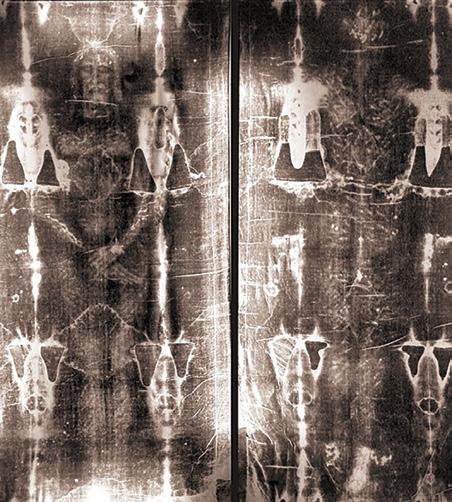
GROW YOUR CHILDREN’S FAITH WITH CATHOLIC SPROUTS

Start a new holy habit by listening daily to “Catholic Sprouts,” a fun and faith-filled podcast for kids. Featuring saint stories, lessons on vice and virtue, liturgical seasons and more, each episode is just five minutes and sets the tone for the day as children and adults alike grow in knowledge and love of Jesus. Accompanying printable activity sheets and other resources can be found at www.catholicsprouts.com
— Annie Ferguson
ESPAÑOL
VIÑEDO DE RAQUEL: ¿Es usted o un ser querido que busca la curación de los efectos de un aborto anterior? Los retiros de fin de semana son ofrecidos por Caridades Católicas para hombres y mujeres en todas las regiones de la Diócesis de Charlotte. Para obtener información sobre los próximos retiros, comuníquese con Karina Hernández: 336-267-1937 o karinahernandez@live.com.
VIGILIA DE ADORACIÓN: 6 p.m. los jueves, en la Catedral San Patricio, 1621 Dilworth Road East, Charlotte. Nos reunimos para una Vigilia de Adoración por la Paz y la Justiciaen Nicaragua, que en estos últimos meses están pasando por momentos turbulentos y ataques físicos contra la Iglesia Católica, sus templos, y sus Obispos. Todos son bienvenidos a unirse a la Adoración, rezar el Santo Rosario, la hora santa de reparación, y terminando con la oración de exorcismo de San Miguel Arcángel.
IGBO MASS : 11:30 a.m. Sunday, July 23, St. Mary’s Church, 812 Duke St. Park at Windsor Center. For details, call 336-707-3625.
ANOINTING MASS : 10 a.m. Saturday, Aug. 12, St. Luke Church, 9800 Fairview Road, Mint Hill. Anointing is typically presented to those who need healing from physical or mental illness, or who will be undergoing surgery. For details, call Mary Adams, 704-545-1224. Sponsored by the HOPE Committee.
ST. PEREGRINE HEALING PRAYER : 6-7 p.m. second Thursday of each month in the New Life Center Building adjacent to St. Matthew Church, 8015 Ballantyne Commons Pkwy., Charlotte. St. Peregrine healing prayer service includes a blessing with a relic of St. Peregrine. St. Peregrine has been called the wonder worker for his intercession on behalf of those living with serious illness. He is the patron saint of all who are afflicted by cancer,
Scan the QR code for this week’s recommendations and activities:

leg ailments or any life-threatening disease. He is also the patron saint of at-risk youth. All are welcome.
PRO-LIFE ROSARY: After the 9 a.m. Mass every third Sunday at Mother Teresa Pro-Life Memorial, St. Vincent de Paul Church, 6828 Old Reid Road, Charlotte
HOLY APOSTLE AND EVANGELIST LUKE MISSION (UKRAINIAN CATHOLIC CHURCH): Divine Liturgy (Mass) at 3 p.m. Sundays at St. Barnabas Church, 109 Crescent Hill Road, Arden. For details, email ucmcanton@gmail.com.
RACHEL RETREAT: Are you or a loved one seeking healing from the effects of a past abortion? Rachel Retreat weekends are offered by the diocesan Office of Family Life a few times a year for men and women in both English and Spanish. For details, contact Jessica Grabowski: 704-370-3229 or jrgrabowski@rcdoc.org.
In the year 250 AD, seven young Christian men fled the persecution of the Roman Emperor Decius, taking shelter in a cave outside the city of Ephesus. There in the cave, the men prayed and eventually fell asleep. Decius, seeing that they had refused to abandon their Christian faith and embrace his pagan beliefs, ordered that the mouth of the cave be sealed with the men still inside.
Decius died just a year later, and during the years that followed, Christianity found gradual acceptance in the Roman Empire. By the time of Emperor Theodosius II (408-450 A.D.), Christianity had become the official state religion.
One day, the story goes, the landowner decided to open the mouth of the cave, in order to use it as a cattle pen. He opened it and found the men inside – still sleeping. As light streamed into the cave for the first time in nearly two hundred years, the men awoke. Confused, they at first believed that they’d been sleeping just one night. But when one of the men left the cave in search of food, he found that Christianity was no longer a persecuted religion in Ephesus. In fact, most people now shared his belief in Jesus Christ, and there were crosses openly displayed atop buildings in the town.
The townspeople, surprised by this group of young strangers who still carried coins from the ancient Decius era, told Marinus, the bishop, about them. Marinus interviewed the sleepers, and all recounted the same story of seeking refuge in the cave. Then, singing praises to God, the men died.
The legend of the Seven Sleepers has been told in many cultures, with some small variations, and has been depicted in art throughout the centuries.
On the Eastern Orthodox and Byzantine Rite calendar, the Seven Holy Youths (Holy Sleepers) are remembered each Aug, 4, and their names are: Maximilian, Jamblicus, Martinian, John, Dionysius, Exacustodian (Constantine) and Antoninus.

In Islam, the Muslim Qur’an (Surah 18, verse 9-26) recounts a similar story – although in the Muslim version, the men had a dog who accompanied them to the cave, and who stood guard at the door for the entire time they were asleep. Muslims refer to the men as “People of the Cave.” Muhammad explains the story to his followers and is thus granted the status of being a prophet.
In The Golden Legend, a popular book of the late Middle Ages, the writer adds a new detail: that their resurrection occurred in the year 378, during the reign of Theodosius.
In the Roman Martyrology, the Seven Sleepers are mentioned on July 27, as follows: “Commemoration of the seven Holy Sleepers of Ephesus, who, it is recounted, after undergoing martyrdom, rest in peace, awaiting the day of resurrection.”
On the slopes of Mount Pion, near the ancient
JULY 23-29
Sunday: Wisdom 12:13, 16-19, Romans 8:26-27, Matthew 13:2443; Monday (St. Sharbel Makhluf): Exodus 14:5-18, Exodus 15:1-6, Matthew 12:38-42; Tuesday (St. James): 2 Corinthians 4:7-15, Matthew 20:20-28; Wednesday (Sts. Joachim and Anne): Exodus 16:1-5, 9-15, Matthew 13:1-9; Thursday: Exodus 19:1-2, 9-11, 16-20b, Daniel 3:52-56, Matthew 13:10-17; Friday: Exodus 20:1-17, Matthew 13:18-23; Saturday (Sts. Martha, Mary and Lazarus): Exodus 24:3-8, John 11:19-27
city of Ephesus, a popular pilgrimage site is an early Christian catacomb over which a fifth-century church had been constructed. When the catacomb was first excavated in 1927-’28, archeologists found inscriptions dedicated to the Seven Sleepers on the walls of the church and in the graves. And during the Crusades, victorious troops transported bones from the graves, identified as relics from the Seven Sleepers, back with them to Marseilles in a large stone coffin.
The Seven Sleepers have found their way into literature: in the poetry of John Donne, in a 1530s play by John Heywood, in a poem by Goethe, in Washington Irving’s “Rip Van Winkle,” in H.G. Wells’ “The Sleeper Awakes,” and many other works.
The Seven Sleepers are sometimes compared to Rip Van Winkle, but no – the story is really dramatically different. In the case of Washington Irving’s legendary character from the time of the Revolutionary War, most analysts seem to regard Rip as a man who was wasting his life away, letting
JULY 30-AUG. 5
Sunday: 1 Kings 3:5, 7-12, Romans 8:28-30, Matthew 13:44-52; Monday (St. Ignatius of Loyola): Exodus 32:15-24, 30-34, Matthew 13:31-35; Tuesday (St. Alphonsus Liguori): Exodus 33:7-11, 34:5b-9, 28, Matthew 13:36-43; Wednesday (St. Eusebius of Vercelli, St. Peter Julian Eymard): Exodus 34:29-35, Matthew 13:44-46; Thursday: Exodus 40:16-21, 3438, Matthew 13:47-53; Friday (St. John Vianney): Leviticus 23:1, 4-11, 15-16, 27, 34b-37, Matthew 13:54-58; Saturday (The Dedication of the Basilica of St. Mary Major): Leviticus 25:1, 8-17, Matthew 14:1-12
A ninthcentury Greek icon depicts the “Seven Sleepers” waking from their 200-year slumber.
WIKIMEDIA COMMONS
the world pass him by while he merely existed in a bad marriage, without attempting to right what was wrong in his daily life. In sharp contrast, the Seven Sleepers were brave and righteous men who had turned their hearts and minds to God; and their heavenly Creator protected them from the fury of a pagan king, holding their lives in suspended animation for nearly 200 years.
But is the story true? I don’t know, but does that really matter?
The takeaway for the Christian reader is that God will always protect us, that we may face opponents but we need not fear, for God is with us.
KATHY SCHIFFER is a Catholic blogger. In addition to her blog Seasons of Grace, her articles have appeared in the National Catholic Register, Aleteia, Zenit, the Michigan Catholic, Legatus Magazine, and other Catholic publications. This article was originally published in National Catholic Register on Aug. 5, 2016 (c) 2023 EWTN News, Inc. Reprinted with permission from the National Catholic Register: www.ncregister.com.
AUG. 6-12
Sunday (The Transfiguration of the Lord): Daniel 7:9-10, 1314, 2 Peter 1:16-19, Matthew 17:1-9; Monday (St. Sixthus II and Companions, St. Cajetan): Numbers 11:4b-15, Matthew 14:13-21; Tuesday (St. Dominic): Numbers 12:1-13, Matthew 14:22-36; Wednesday (St. Teresa Benedicta of the Cross): Numbers 13:1-2, 25-14:1, 26-29a, 34-35, Matthew 15:21-28; Thursday (St. Lawrence): 2 Corinthians 9:6-10, John 12:24-26; Friday (St. Clare): Deuteronomy 4:32-40, Matthew 16:24-28; Saturday (St. Jane Frances de Chantal): Deuteronomy 6:4-13, Matthew 17:14-20
For the latest news 24/7: catholicnewsherald.com

CHARLOTTE — Darien N. Clark has been named director of the Diocese of Charlotte’s Campus and Young Adult Ministry. Clark served as assistant director since 2018 and as acting director since July 2022, after longtime director Mary M. Wright retired.
Before coming to the Charlotte diocese, Clark served in campus ministry at colleges in the dioceses of Charleston, S.C.; St. Cloud, Minn.; and Richmond, Va. He holds a bachelor’s degree in history and religion from Syracuse University and a master’s degree in religious education from Fordham University. He and his wife, Clara, are members of St. Peter Parish in Charlotte.
“Darien has been a great team member of the Office of Campus and Young Adult Ministry as well as the various departments of the Education Vicariate and the diocese,” said Father Roger K. Arnsparger, diocesan vicar of education for catechetical formation, in a recent announcement. “The Education Vicariate offers him our support as we move forward and our gratitude for the good work he has already done as the acting director for this past year.
“This diocese is blessed with a gifted and devoted team of campus ministers who provide for the needs of our college students. I am grateful for the opportunity to continue to advance and support this critical mission of the Church –ensuring that young adults have access to a Catholic community that is rooted in Christ and the Eucharist during college and beyond.”
— Catholic News Herald
CHARLOTTE — David Vasquez has joined the Diocese of Charlotte as its Safe Environment coordinator.
Vasquez is responsible for overseeing the diocese’s comprehensive program for safeguarding children and vulnerable adults, ensuring compliance with the U.S. bishops’ Charter for the Protection for Children and Young People.
Vasquez brings more than three decades of professional experience in customer service and two decades of parish ministry leadership to this role.
While working in the banking and technology sectors, Vasquez focused on customer care and relationship management in highly regulated industries – particularly customer experience quality, complaint management and problem resolution. In senior leadership positions at both Ally Bank and Bank of America, he launched and supported digital products, services and processes to improve the customer experience, better address customers’ needs, and foster a responsive, problemsolving culture.
During his service on parish pastoral and finance councils, Vasquez gained an appreciation for the importance of the diocese’s mandatory Safe Environment training for employees and volunteers.
A Detroit native, he and his wife, Julie, moved to Waxhaw 20 years ago. They have three grown children and are members of St. Gabriel Parish in Charlotte.

“The diocese was an enthusiastic early adopter of Safe Environment protocols when the charter was established in 2002, and it has a successful record of compliance over the past two decades,” Vasquez said. “I look forward to continuing and building upon that commitment to accountability and transparency in this role.”
— Catholic News Herald
CHARLOTTE — Nearly 30 people from across the diocese celebrated the grand opening of Catholic Charities Diocese of Charlotte’s new office in North Wilkesboro July 11.
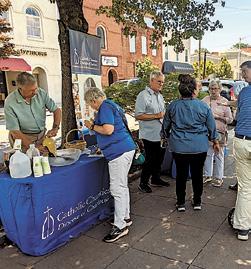

The day began with a blessing and open house held in the afternoon. Father John Hanic, pastor of St. John Baptist de La Salle Parish in North Wilkesboro and St. Stephen Mission in Elkin, and vicar of the Boone Vicariate, blessed the new venture.
The newest Catholic Charities office in the diocese, its seventh, is located at 201 Tenth St. in North Wilkesboro. Accompanying Father Hanic at this event were St. Stephen’s pastoral associate Sister Janis McQuade, S.S.J., parishioners from both churches, Catholic Charities staff and volunteers, and members of the local community, including the mayor of North Wilkesboro. The blessing ceremony was followed by a dessert celebration and an open house providing tours of the new office.
The newest Catholic Charities office will mainly focus its ministerial efforts on providing a Wee Care Ministry and will assist families in need of infant and toddler items such as diapers, baby wipes, blankets, clothes and other items. The office is available to help residents of the surrounding Alleghany, Ashe, Watauga and Wilkes counties. Catholic Charities’ help is provided at no charge to households facing economic hurdles and is provided in English and Spanish, regardless of age, race, ethnicity, religious affiliation, or socioeconomic background. Assistance is provided by appointment. Appointments can be scheduled by calling Catholic Charities staff member Silvia Echeverria at 828-434-5710 between 9 a.m. and 5 p.m. Monday-Friday.
— Catholic News Herald
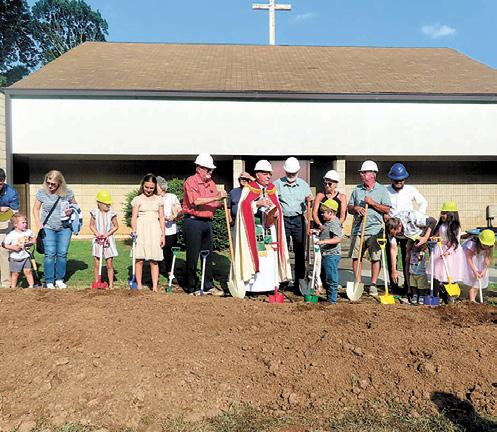
STATESVILLE — On July 8, after the Saturday evening Mass, Father Thomas Kessler, outgoing pastor at St. Philip the Apostle Parish in Statesville, and several members of the parish’s Forward with Christ Building and Planning Committee broke ground in the final phase of the parish’s building project, which is in its eighth year. The last building to be constructed is the parish activity and education building. Parishioners gathered outside to join in with the groundbreaking prayers. Alongside the committee members, several children of the parish joined in to help dig. The construction is expected to begin in August.
Paul
(left of Father Kessler), and three more of the members: Kevin Burns, Dawn McGinn and Phil Arrington.
— Catholic News Herald
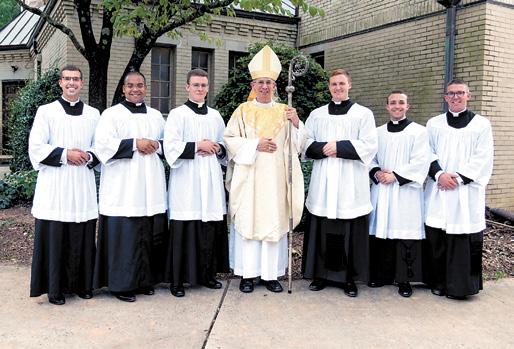 PATRICIA L. GUILFOYLE plguilfoyle@charlottediocese.org
PATRICIA L. GUILFOYLE plguilfoyle@charlottediocese.org
CHARLOTTE — Six Diocese of Charlotte seminarians stood before Bishop Peter Jugis Thursday at St. Patrick Cathedral and affirmed their desire to advance along the path toward the priesthood.
Kolbe Flood, James Johnson IV, Patrick Martin, Emanuel Martinez, Connor White and Bailey Van Nosdall all recently graduated from St. Joseph College Seminary in Mount Holly and will now move on to studies at a major seminary this fall.
The special Mass July 6 featuring the Rite of Admission to Candidacy for Holy Orders marked an official step for the seminarians to embark on a more focused period of formation.
During his homily, Bishop Jugis noted that the readings for this special Mass from Isaiah, St. Paul and the Gospel of Matthew – chosen especially for the occasion – all describe answering God’s call to minister to His people.
In Isaiah, chapter six, God asks for someone to be His prophet, and Isaiah answers: “Here am I, Lord. Send me!”
“You can sense the enthusiasm and eagerness in the response of Isaiah: ‘Send me!’ he exclaims,” Bishop Jugis said to the young men before him.
The bishop continued, “When I entered the seminary in 1979, the Diocese of Charlotte was only seven years old. With limited resources, we seminarians and priests learned through those early years that what was needed from everybody was
a spirit of availability and adaptability to do the work. In other words, the spirit of Isaiah.
“Now, after 51 years as a diocese, that same spirit is needed as the diocese continues its phenomenal growth.
“You young men who are now to become candidates for holy orders are already servants of the Lord. By your lives, you bear witness to Christ and His Kingdom. With the eagerness and enthusiasm of Isaiah, you come today to pursue your vocation to holy orders,” the bishop said. “You do this, as St. Paul says in his letter to the Corinthians, for the sake of the Gospel. Out of your love for Christ, you desire to give your life in service to Him.
“And so, in this Mass, we fulfill Jesus’ command, as we hear in the Gospel according to St. Matthew, to ask the master of the harvest to send out laborers for his harvest. We do this by bestowing on you the Church’s official blessing as candidates, and asking the Lord to continue to form you to become His sacred ministers” to “help lead people to Christ.”
‘WE WILL ALL ASSIST YOU’
Through formation up to this point, he told the six seminarians, “you have come to the point of making a public declaration of your desire to devote yourself to service to God and others. We welcome this desire with joy.”
Bishop Jugis encouraged them to continue to grow in faith, hope and charity through prayer and a deeper exploration of their possible vocation as priests.
“Trusting in the Lord, we will all
assist you with our charity and with our prayers,” he said.
The next steps in the men’s formation will be ministry of lector, ministry of acolyte, ordination to the transitional diaconate, and finally, ordination to the priesthood.
The Charlotte diocese now has 51 men in its growing seminarian program, with more applicants expected before the school year begins this fall.
In his remarks, Bishop Jugis said, “We thank the good Lord for the many ways that He is blessing us.”
 ANNIE FERGUSON arferguson@charlottediocese.org
ANNIE FERGUSON arferguson@charlottediocese.org
MOUNT HOLLY — In the search for someone to lead St. Joseph College Seminary’s music program after the sudden passing of beloved music director Tom Savoy, it would seem the seminary has found a match made in heaven in Andrew Mahon, a deeply devoted liturgical musician with extensive teaching and professional singing experience.
Ever seeking the “seamless integration of music and the liturgy,” Mahon saw the music director position posted by Father Matthew Kauth, rector at St. Joseph College Seminary, as a providential opportunity in this pursuit as it would allow him to work with future priests who will bring their sacred music experience to the wider Church.
“I had wanted to work in a seminary for some time, since it presents the opportunity to teach and make music in classes, rehearsals, and on a one-to-one basis,” he said. “This is appealing because it means I can approach sacred music and proper singing with the seminarians intellectually, practically and technically.”
Mahon also noted that there aren’t many seminaries that place the same emphasis on sacred music as St. Joseph College Seminary.
“When I first came across the position and learned more about Father Kauth’s vision, I noticed immediately that the ethos of the seminary mapped onto what I felt I could offer as a liturgical singer,” he said. “Now that I’m becoming more familiar with the seminary, I can’t imagine a better place to live out my vocation as a church musician.”
Mahon, who grew up in Toronto, began singing in church choirs at the age of 6. By the time he was in college at the University of Toronto, he was singing in choirs professionally as a bass-baritone.
“I didn’t initially have the ambition of becoming a professional singer, but singing work continued to come my way, and eventually it became my career,” he said. “In
2009, I moved to England, which maintains a robust choral tradition, and for over a decade I was able to sing sacred music in a liturgical setting on an almost daily basis.”
He sang in the choir of Wells Cathedral in Somerset before moving to London in 2013 to pursue further opportunities with English and German chamber choirs, alongside his solo career.
“I prioritized liturgical singing, which I found to be the most fulfilling kind of singing,” he said. “The Anglican choral tradition being what it is, most of my work was in the Church of England, where a tremendous amount of Catholic sacred music is still sung. However, I also sang at the great Catholic churches of England, which maintain a similar standard of choral music, second to none in the world.”
These experiences led to Mahon’s conversion to the Catholic faith. Having been baptized into the Anglican Church as an infant, he remained Anglican for most of his time in England but was received into the Catholic Church in 2017 in London through the Ordinariate of Our Lady of Walsingham.
Mahon moved to the United States in 2021 and began working in Minnesota in 2022. He served as director of music and liturgy for Mary, Mother of the Church Area Catholic Community (ACC) in the Diocese of St. Cloud, Minnesota, where he directed the choir at St. Ann’s Catholic Church in Wadena and oversaw the liturgical direction for the eight parishes that make up the ACC, which is the largest of its kind. Mahon has also acted as a consultant for various Catholic communities, focusing on sacred music in the liturgy. Now in the Charlotte diocese, he and his wife, Marie-Claire, and their young children have settled in Mount Holly.
For Mahon, singing sacred music as part of the liturgy is something one must do daily to master.
“The habitual singing of Gregorian chant as part of a liturgical routine yields a different kind of excellence to an
occasional prepared and polished performance,” he said. “It is a functional and lived excellence, where the singers learn to worship through singing. It gets into their bodies –not just this or that specific chant or motet, but rather the genre itself almost becomes a part of them.”
The seminary offers the opportunity to worship daily through singing, making it an ideal setting for the music to permeate the souls of the future priests whose musicianship Mahon will help form.
“The seminarians I have met so far are very impressive young men – disciplined, enthusiastic, and keen to learn,” Mahon said. “It will be an honor to work with them as part of Father Kauth’s team.”
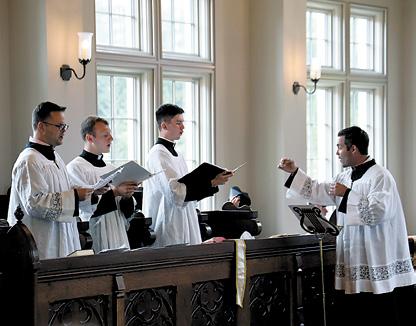
ARDEN — More than 70 people gathered for prayer and reflection at the 10th annual East Meets West Retreat June 23-24 at St. Barnabas Church in Arden.
Now in its 10th year, the retreat is hosted by Holy Apostle and Evangelist Luke Ukrainian Catholic Mission, which meets at St. Barnabas Church. This year’s retreat was led by Dr. Matthew K. Minerd, who gave a lecture and workshops on the theme “Living a Life in Christ.”

“The Lord’s glory is meant to be our glory,” Minerd explained. “And to live in the Lord’s glory, we must purify ourselves of the passions and live a sacramental life, which opens us to the grace of God.”
A widely published philosopher and theologian, Minerd is professor of philosophy and moral theology at Byzantine Catholic Seminary of Saints Cyril and Methodius in Pittsburgh, Pa., and head of the graduate philosophy program at Holy Apostles College and Seminary in Cromwell, Conn. He based his talks on his recently published book “Made By God, Made For God: Catholic Morality Explained,” now available from Ascension Press. In explaining how we can live in the Lord’s glory, Minerd developed three themes using passages from the Gospels, the epistles of St. Paul, writings of saints and theologians, and short eastern Christian hymns called “troparia.” These themes included: To live a moral life is to live in Christ; to live in Christ requires us to purify ourselves through fasting and prayer, to deny ourselves, so that we can be filled with grace and the light of Christ; and eternity begins now, in this life.
In addition to these lectures, participants spent time in prayer and reflection, singing traditional Eastern prayers, the “Compline” and the “Akathist to the Mother of God,” sixth-century hymns attributed to St. Romanus the Melodist.
The retreat and prayers were led by Father Kevin Bezner, administrator of Holy Apostle and Evangelist Luke, with assistance from Deacon Matthew Hanes of St. Basil the Great Ukrainian Catholic Parish in Charlotte, Deacon Michael Sudik of St. Sophia Ukrainian Catholic Parish in Garner, and Cantor Ann Bezner of Holy Apostle and Evangelist Luke Mission.
For more information about the annual East Meets West Retreat or Holy Apostle and Evangelist Luke Mission, go to www. saintbarnabasarden.org or email Father Kevin Bezner at ucmcanton@gmail.com.
— Catholic News Herald

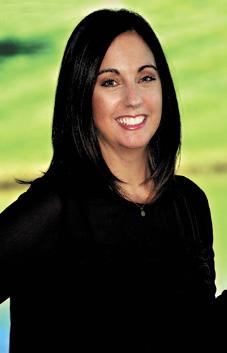
BREVARD — Dr. Marion Underhill’s influence as a lifelong educator will continue even after death thanks to the generous $300,000 gift she left as an endowment to support religious education for youth at Sacred Heart Catholic Church in Brevard.
“This endowment will be a tremendous blessing to our parish,” said Father Shawn O’Neal, pastor of Sacred Heart. “Marion’s gift to us reflects her lifelong passion for educating young people. I am grateful for her legacy that she leaves here at Sacred Heart, and we are committed to making sure it makes a real difference.”
Underhill passed away in November 2022 at age 97 in her beloved Brevard. Her extensive background in education began when she attended State Teachers College, Columbia University in New York and the University of Delaware, where she received a doctoral degree in theology. She spent her career as a high school English teacher before retiring to Brevard in 1988. She was an active member of Sacred Heart, serving as a Eucharistic minister and tutoring students at local schools throughout the region, including Brevard College, and the Schenck Job Corps, a conservation initiative operated by the U.S. Forest Service.
Former 11th-grade English student Bal Hoeffner fondly remembers Underhill. “She loved teaching her students. Many

of us spent time after school and on some weekends visiting her home.” Former student Arlene Hoff Cooper added, “She was the best teacher I ever had. She was a warm and loving mentor to all her students. I am privileged to have known her.”
Sacred Heart has played an important role in the religious education of generations. The parish’s roots date back to the early 1940s when a mission was formed to serve Catholics from in and around Pisgah forest, where the Ecusta Paper Corp. drove Catholic employees in a station wagon to Sunday Mass at Immaculate Conception in nearby Hendersonville. As the population grew, through the efforts of a few dedicated families Sacred Heart was built and was formally dedicated by Bishop Vincent Waters of Raleigh on Aug. 28, 1949.
Underhill’s endowment will help the next generation of young Catholics learn, explore and prepare for life’s challenges ahead.
“Having opportunities to get out of the classroom and experience the love and mercy of God amongst their peers and within the community is where true encounter takes place,” said Jenni Pogue, Sacred Heart’s office manager. “ This new Marion L. Underhill Memorial Endowment will help ensure that such opportunities will continue to be available to our young people.”
“The entire diocese expresses gratitude for Underhill and more than 1,600 people like her who have or are remembering the church in their estate plans,” said Development Director Jim Kelley. “These individuals think in advance about how to help others and to make the Catholic faith accessible to more people.”
“Marion Underhill was a teacher at heart and took steps to ensure future generations would experience the benefits of religious education,” he added. “She lived a wonderfully long life, teaching countless children in school and at church – and her gift will continue that legacy.”
The Catholic Diocese of Charlotte and its best-in-class news outlet, the Catholic News Herald, want you to help “tell our story” in compelling ways. Key qualifications include enthusiasm, creativity, an eye for detail, a love for storytelling, and the ability to work on multiple projects simultaneously as part of a mission-focused team of like-minded colleagues.
Enjoy a family-friendly environment with benefits package with competitive salary, health/dental/vision/other insurance, 403(b) with robust employer match, and generous vacation and sick time (and lots of Church holidays).

We’re proud to be an equal opportunity employer.
As our graphic designer, be a key team player in creating engaging designs for a wide range of print and digital marketing, communications and news projects – everything from posters and prayer cards to interactive graphics and design of the Catholic News Herald. Must have graphic design experience and proficiency with Adobe, MS Office, WordPress and Joomla.
Write stories, cover events, and produce multimedia content showcasing the diverse and faith-filled parishes, schools, ministries and people of our diocese – to inform, educate and inspire our print and digital audiences of 200,000+ people. Must have at least 1-3+ years of professional writing experience, and a bachelor’s degree in journalism, marketing or related field.
Get details and apply: www.catholicnewsherald.com/jobs


BELMONT — On Tuesday, July 11, the Feast of St. Benedict, the monastic community of Belmont Abbey celebrated the profession of solemn vows by Brother Leo Young, O.S.B. The celebration occurred during the regularly scheduled 11 a.m. daily Mass at The Basilica of Mary Help of Christians. The Mass was open to the public and the Belmont Abbey College community. The occasion was one of joy, with standing room only in the basilica. Abbot Placid Solari concelebrated the Mass alongside 12 priests and several seminarians, who joined the community for this wonderful event. A native of Winston-Salem and with his family as long-time parishioners at St. Leo the Great, Brother Leo entered the monastic community in March of 2018 as a postulant and now joins the monks at Belmont Abbey as a full member of the Benedictine community.
— Catholic News Herald,
BELMONT — Hundreds watched as Sister Phuong Dong made her profession of perpetual vows as a Sister of Mercy June 10 at Sacred Heart Convent in Belmont.
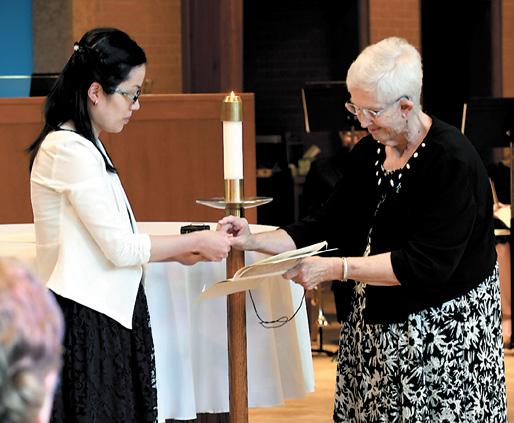
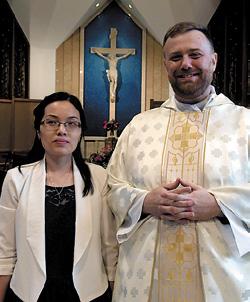
Mercy Sister Eileen Campbell, director of new membership, welcomed those gathered while remarking on the unique gifts Sister Phuong brings to the order.
“Now, we know Phuong is quiet, but that in no way means that she is shy and retiring – although she’d like us to think so,” Sister Eileen said. “Phuong does her fair share of stirring things up in a good way, encouraging and motivating us.”
Sister Phuong’s parents, sister and extended family were present to witness her profession. They were joined by the Institute Leadership Team, Sisters of Mercy from the United States and the Philippines, and more than 500 people who viewed the ceremony online.
Father Paul Buchanan, pastor of Queen of the Apostles Parish in Belmont, began Mass with the sprinkling rite to remind all gathered of the promises made at baptism.
Mercy Sister Elizabeth Bui-Thi-Nghia read the first scripture passage in Vietnamese, followed by Mercy Sister Patricia Coward, who delivered the second reading in English.
During her instruction on the vows, Mercy Sister Denise Sausville began by noting that Sister Phuong’s profession was being held on the feast of the Most Holy Body and Blood of Christ.
“God has become one of us, in and through a body. The Eucharist reminds us of this,” Sister Denise said. “Today, Phuong, guided by the Holy Spirit, you are choosing to grow into your truth by living the life-form of consecrated religious life.”
She continued, “Within this life-form, you are pledging to live in a more focused
and intense way the evangelical counsels – the three vows of poverty, celibacy and obedience – relying on God’s love and grace.”
At the June 10 event, Sister Phuong professed her vows in both English and Vietnamese, with Mercy Sisters Rose Marie Tresp and Joann Margaret Ury as witnesses.
She first entered the Sisters of Mercy in August 2012. Sister Phuong chose Jeremiah 31:3 as her motto, which is inscribed on her ring: “I have loved you with an everlasting love.”
— Catholic News Herald
The parish of Mary, Queen of the Apostles, in Belmont, NC is looking for a Director of Family and Youth Discipleship.
The primary responsibility of the position is to empower parents to be the first and best teachers of the Catholic faith to their children, and to provide supplementary formation directly to youth so that they can come to know and love Jesus Christ in a deeper way in and through the Catholic Church.
Specifically, this position will be responsible for the planning and implementation of:
* "A Family of Faith" Catechesis program (K-8 students and parents)
* Youth group (Edge and LifeTeen)
* Vacation Bible School
* First Sacraments Preparation and RCIC
This position will also be responsible for the recruitment, training, and oversight of many volunteers to help run our programs. Availability on the weekends is essential. Working hours during the week can usually be flexible, subject to the needs of the parish according to the judgment of the pastor or Director of Parish Operations.
The minimum education required is a bachelor's degree in Catholic theology or catechetics. The successful candidate must be a practicing Catholic in good standing with the Church. Safe environment training and compliance is essential.
This position reports to the Director of Parish Operations, overseen by the pastor, and will work closely with the Director of Communications to facilitate engagement with the families of our parish.
Send applications or inquiries to: parishops@queenoftheapostles.org
‘I have loved you with an everlasting love’PHOTOS PROVIDED BY BOB KEENAN Mercy Sister Phuong Dong receives her ring during her final profession of vows June 10 at Sacred Heart Convent in Belmont. Father Paul Buchanan offered the Mass for Sister Phuong Dong’s final profession of vows.
 ANNIE FERGUSON arferguson@charlottediocese.org
ANNIE FERGUSON arferguson@charlottediocese.org
GREENSBORO — In a few short weeks, students in the Diocese of Charlotte will be out of the pool and back in school. But for Catherine Ermis, a rising fourth-grader at Our Lady of Grace Catholic School in Greensboro, days in the pool have only just begun.
The spirited 9-year-old is fresh off winning a gold medal in the 9 and under 3-meter springboard diving competition at the 2023 AAU National Championships in May – after just two years of training.
She is now considered among the best divers in the world for her age group.
“After winning, I felt really good. My hard work paid off!” Catherine says.
She trained before and after school for 25 to 30 hours a week leading up to the competition, working to perfect four different dives, including an inward one and a half somersault tuck, something she began working on after she qualified for the championships the month before the event.
“Big dreams mean big work,” Catherine says. “You have to do a lot of work to reach your dreams.”
After winning the gold medal, she earned a spot on the AAU national team and will compete with other young divers this fall in Ireland and Scotland.

The inevitable question about Olympic dreams comes up often. Catherine’s response? She’s focused on the national team and says the Olympics are a long time from now. She’d be aiming for the 2032 Games.
The past two years have been enough of a whirlwind for Catherine, her parents, and her five siblings. Countless hours of training, travel to national and international competitions, and appointments to keep, not to mention all the everyday joys and demands of family life.
Catherine’s mother, Elizabeth, says they wouldn’t have it any other way, noting how much her daughter loves the sport.
“I feel like I’m flying when I dive,” Catherine says. Elizabeth says Catherine’s interest in diving began when she began heckling her older brother from the stands at his diving practice.
“She’s up there giving him a hard time about what he is or isn’t doing, and the coach said, ‘She’s mouthy. Do you think you can just come down here and show us all how to do it?’” Elizabeth recalls.
Full of spunk and confidence, Catherine accepted the challenge.
“She’s definitely the most fearless of all of my kids,” Elizabeth says. “So, anything that they would ask her to do, she was like, ‘Sure, I’ll do that.’”
At the end of a two-week diving trial, Catherine’s natural talent was evident. She began training in 2021 and participated in her first competition, the AAU National Championships in Texas, just a year later. She came in 12th out of 67 in her age group at the 2022 competition.
Then she was invited to compete at an international event in Argentina in November 2022.
By the time the qualifying event for the 2023 national championships in Orlando rolled around in the spring, Elizabeth began seeing more clearly God’s hand in Catherine’s diving career.
“We were already going to be in Florida visiting my parents. At that point, we didn’t really have solid plans to try to go to the nationals, but I said to her coach, ‘Look, this qualifier is happening. We’re already going to be there. Do you think it would be worthwhile to just go and see how she would do at another larger scale meet?’”
The coach agreed to give it a try, saying, “You never know what’s going to happen.”
“I don’t think any of us had any expectation that she would win both of the events at the qualifier and then go on to win
DREAMS, SEE PAGE 10
BATRICE ADCOCK
Special to the Catholic News Herald
CHARLOTTE — As dioceses across the country commemorate Natural Family Planning Awareness Week July 23-29, the Diocese of Charlotte is offering new resources to help parents communicate the beauty of God’s plan for sexuality to their children. This can be a challenge, particularly when a young woman enters puberty and may not feel well equipped to discuss the changes going on in her body.
“Cycle Prep” is a new class offered by the diocese’s Office of Family Life to help parents support their daughters through puberty and communicate positively about the physical, mental, and spiritual growth that is a part of this process.
Mothers and daughters attend Cycle Prep together. The course is offered at various times at parishes across the diocese. It provides biologically accurate information and promotes understanding of the menstrual cycle as a vital sign in the fertility process and one closely tied to health and well-being. Stories and animation geared for girls ages 9 to 11 are used to convey the structural and physiological components of the menstrual cycle. Self-care and hygiene are other topics covered in the class. The course opens the
conversation about fertility as a gift from God and a personal vocation.
The Office of Family Life supplements Cycle Prep with additional resources to help parents integrate the course material with Church teaching. The course aims to serve as a beginning for many intimate conversations about sexuality, and other courses are recommended to help facilitate ongoing communication.
TeenFEMM, taught by Betsy Hoyt, a member of St. Thomas Aquinas Parish in Charlotte, is another course that provides insight.
“My favorite part of teaching this course is when girls realize that their mom has experienced the same things they are experiencing,” Hoyt said. “As a teacher, it is such a gift to be a part of this beautiful ‘a-ha’ moment. Seeing daughters connect with their mothers is such a grace!”
TeenFEMM, Hoyt says, offers a wholewoman perspective and gives the girls and their moms an opportunity and a space for open, honest conversation about the gift of their shared femininity.
Elisabeth Laskowski, a member of St. Mark Parish in Huntersville, recently offered “God’s Glorious Girl,” a class and tea day for mothers and their preteen daughters. With dozens of attendees, the event was aimed at helping mothers

educate their daughters about the gift of their unique femininity.
The need for positive, proactive programs on sexuality is apparent. In a recent Zoom conversation, co-hosted by NFP instructor Elizabeth Harris and the Office of Family Life, Catholic women from around the diocese expressed negative views about sexuality and had experienced related trauma. The women completed a survey that showed very few participant families had discussed sexuality openly and in a
positive way, and none of the participants felt their “sex talk” was helpful.
Mothers often recall their own negative experiences of their first period and fear approaching the subject with their daughters. How and when should they bring it up? What should they say? Mothers feel a great deal of pressure to get it right so their daughters have a better experience.
Interestingly, survey participants said the Church community has been most influential in forming their views on human sexuality overall. Many women began to experience healing and a change of perspective in adulthood, especially through the sacrament of marriage and the discovery of Catholic teachings, such as “Theology of the Body,” a series of lectures given by then Pope (now St.) John Paul II. With resources like these and others offered by the Church, parents can confidently and positively shape their children for what God has called them to be.
BATRICE ADCOCK, MSN, RN, is the diocese’s Natural Family Planning program director.More online
At www.charlottediocese.org/office-offamily-life : Learn more about NFP and family courses. Click on “NFP Resources.”
CHARLOTTE — The smiles and hugs exchanged between old and new friends best tell the story of the 22nd session of Camp SOAR (Special Olympics Athletic Retreat), which ran June 13-17 at Charlotte’s Levine Jewish Community Center. Nearly 400 volunteers, including some 100 Charlotte Catholic High School students and alumni, gathered at Levine JCC to offer the sports and activities of a typical summer camp to more than 300 persons with disabilities.
Shelley Floriani coordinates the Options Program at Charlotte Catholic, assisting students with special needs through the challenges of their high school experiences. A first-time volunteer, she identified the ingredients of Camp SOAR’s successful recipe: “For me Camp SOAR is love and friendship.” Moved by the joy in the faces of her students, Floriani admitted being “equally overwhelmed watching the compassion and joyfulness of their CCHS peers being buddies with the campers.”
Garrett Nowlan, a rising sophomore at Charlotte Catholic in his second year of volunteering, appreciates the charism of mercy that fuels Camp SOAR. “The program is designed so that a friendship is truly made with a buddy,” he explained. “There is a fantastic opportunity for all to compete in sports, activities and challenges where joy is the result!”
For Jason Lowe of Indian Land, a returning camper in his third year, Camp SOAR mixes fun and friendship with lessons of mutual respect. There is “just a lot of kindness all around. I really like basketball and just meeting new people,” Lowe said. “You know, respecting their differences, too, all over … in different areas.”
Twenty-three years ago, this very call to community is what inspired Camp SOAR founder and director Bob Bowler. As a parishioner at St. Gabriel Church since 1970, “It’s in my DNA to create inclusion by promoting a loving, caring community for all,” Bowler shared. “An acceptance of our population.” In a society still processing the long-term effects of the isolation of COVID, Bowler values the interpersonal skills and empathy at the heart of true fellowship.
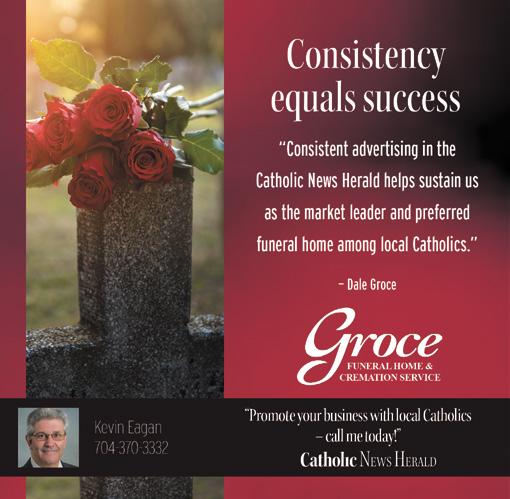
Turning 84 years old this August, Bowler draws boundless energy from the hugs and high-fives of the campers and volunteers graced by Camp SOAR’s “buddy system” and its unofficial motto of “loving, caring, and sharing.” His one birthday wish: “To continue our mission – the excitement and joy – and attract even more campers and volunteers next June 10-14!!”
— Jeremy Kuhn
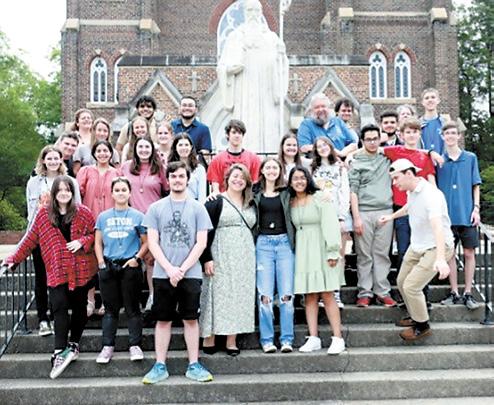
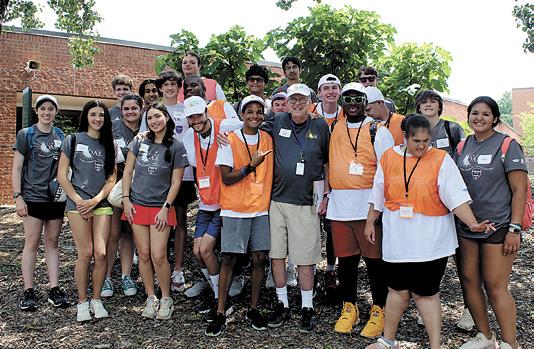
BELMONT — More than 30 teens gathered at Belmont Abbey College on June 18-23 for the Diocese of Charlotte’s annual Faithful Servant Leadership Institute. Started in 1981, the five-day program helps young people explore their God-given leadership potential, with sessions on communication skills, group dynamics, consensus building and negotiation skills, planning, ethics, and evangelization in the modern world. “This year, unlike years previous, we intend to follow the youth participants going forward, encouraging and supporting their continued growth and use of their newfound skills and charge as disciples of Jesus,” said Paul Kotlowski, the diocese’s youth ministry director. “Faithful Servant is the best way to become grounded or re-grounded in your faith,” said participant Cecilia Dierking. “It offers an amazing way to inspire Catholic leadership in the world.”
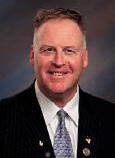
FROM PAGE 8
the national meet,” Elizabeth adds.
Noting that neither she nor her husband Chris is athletic, Elizabeth says Catherine’s gift for diving is not genetic.
“I do really believe that her talent is Godgiven and that God brought her to diving,” she says.
Catherine adds that God helps her family in other ways too.
“We pray that I will be safe before practice and especially at meets,” she says. “It’s a lot of traveling, so we pray for safe travels.”
The Our Lady of Grace School community supports her through prayer
as well, offering encouragement and cheer. When Catherine was preparing to compete in Argentina, the school’s Spanish teacher, Sheila Shearin, had the eighth-grade class create “buena suerte” posters for her. Her third-grade teacher, Celia McMullen, and Principal Catherine Rusch have come to see her dive at practice, and Katie Houston, her first-grade teacher, who has since retired, sent Catherine a handwritten letter after seeing her success in the news.
“It feels really good to have my classmates and teachers support me,” Catherine says. “It helps me do better to know how proud they will be of me.”
More online
At www.catholicnewsherald : Watch the dives that earned Catherine Ermis the gold medal at the AAU National Championships in Orlando.
Consider joining the over 2 million members of the largest, lay Catholic order in the world by signing up online today at: www.kofc.org/joinus
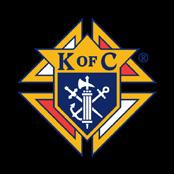
For a Limited Time – FREE Online Membership –Use Promo Code (BLESSEDMCGIVNEY)

Do you have a car sitting in a driveway catching leaves? Maybe it will not star t or needs a major re pair. from the donation of your vehicle

Call 1-855-930-GIVE today!
CCDOC.ORG
Each summer, orchestras and bands across the United States provide outdoor concerts that are quite popular amid the festivities of Independence Day. Curiously, one of the works featured frequently is the “1812 Overture” by Pyotr Il’yich Tchaikovsky. The bizarre tradition of including this quintessential Russian work on American patriotic concerts stems from the early 1970s in Boston.
The overture’s scoring of church bells and cannon fire were believed to complement the subsequent fireworks and increase audience attendance. It has no connection to America’s War of 1812, but rather commemorates Napoleon’s retreat from Moscow.
From a religious perspective, the overture quotes an Orthodox chant. Tchaikovsky, though he had struggles with religion, penned numerous, though lesser known, sacred works, such as the “Liturgy of St. John Chrysostom” (1878) and “Hymn in Honor of Saints Cyril and Methodius” (1885).
In 1880, Tchaikovsky received a commission from Nicolay Rubinstein, director of the Moscow Conservatory. The work was to be connected to the consecration of the Cathedral of Christ the Savior, which was erected to honor the Russian victory over the French army – although it was more of a victory for Mother Nature, as the harsh Moscow winters were the primary cause of the French downfall.
The overture begins with soli for the violas and celli quoting the Orthodox chant “Save us, O Lord” – the low registers coupled with a slow tempo especially enhance the gravity of the opening. As the piece moves along, it assumes a more militant sound through the scoring for tambour militaire (snare drum) before “La Marseillaise,” the French national anthem, appears to represent the French invasion. At the risk of being churlish, it’s worth noting that the anthem had been banned by Napoleon and reinstated only in 1815 and, thus, Tchaikovsky’s use of the tune is not historically accurate. A similar factual inconvenience arises at the end of the work, where the Russian national anthem “God Save the Tsar” is heard amid
Make your car go the extra mile.
Donate your car to Catholic Charities to help fund prog rams for those in need. All vehicle makes, models and years welcome Tr uck, boat, RV and motorcycle donations accepted.
855.930.GIVE (4483) www.ccdoc.org/CARS
Catholic Charities relies on your direct support to help fund its various ministries.
the blasting cannons. This anthem was composed in 1833 – two decades after the events of 1812.
Despite the facts that the “1812 Overture” has nothing to do with the U.S. and that the national anthems incorporated were not in use (or in existence) at the time the work is meant to be set, it remains one of Tchaikovsky’s most beloved works. Part of the appeal is the use of cannons, certainly a rarity in the symphonic … canon.
Tchaikovsky did not think much of this work, and most music critics agree with his assessment. However, he did conduct it himself several times.
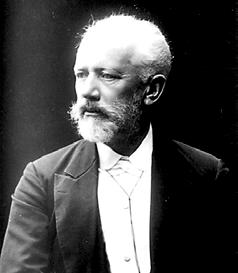
His most beloved compositions, “Nutcracker” and the “1812 Overture,” are not actually representative of his compositional style, which is often quite serious and brimming with great emotion. A more accurate reflection of his symphonic style is his final symphony, nicknamed the “Pathetique,” which premiered only days before the composer fell ill. He eventually died under circumstances that remain unclear and are likely never to be known.
At www.catholicnewsherald.com : Listen to a performance of the “1812 Overture”


Nearly two dozen priests are settling into ministry at new parishes and schools across the Diocese of Charlotte as part of this year’s priest assignment process – a time of excitement and apprehension as priests and parishes embark on a new era together.
Some priests have been appointed to lead a parish as pastor for the first time; others will assist pastors as parochial vicars, serve as school chaplains, or in one case, at the Pennybyrn retirement community in High Point.
The annual assignment announcements from Bishop Peter Jugis – eagerly awaited by priests and parishioners alike each June and July – is one way the local Church responds to the evolving needs of parishes and priests. It’s an auspicious time as priests pack and unpack, move into new rectories in new communities, and begin to forge new relationships with the people they serve.
“It’s the sign of a living Church to have many priests moving around,” said Monsignor Patrick Winslow, who, as vicar general of the diocese, plays an integral role advising the bishop about clergy assignments.

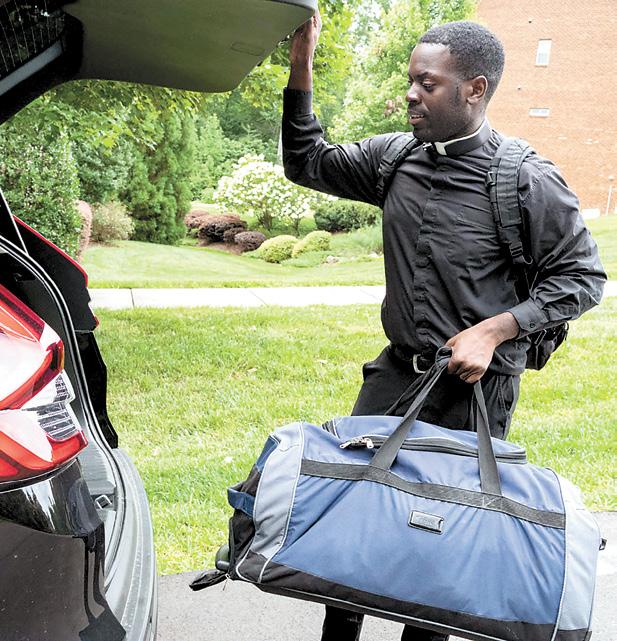
“Necessity drives the equation,” he says. “We are trying to accommodate parish needs in light of growth and priest retirements, deaths, departures for missionary and other work, and at the same time be mindful of priests’ interests. Ultimately, we hope these changes will strengthen the diocese and help spread the Kingdom of God.”
The process begins with a survey sent to priests about their assignments and any ministerial desires they might have to develop their vocation.
Bishop Jugis reviews the surveys and convenes the priest personnel board to help evaluate parish needs and priest input. The board offers recommendations to Bishop Jugis, who either directly or through a delegate speaks with the priests to discuss more deeply. While it can sometimes be challenging to align ministerial inspirations with the needs of the diocese, the process prioritizes practical realities and relies on divine inspiration to discern the best way forward.
“These conversations might appear to resemble the career planning you see in any profession, but they go deeper than that,” says Monsignor Winslow, who has served in eight assignments over 24 years. “Each priest has come to know the conviction of a vocation to sacred ministry. He is aware that sometimes he must be prepared to go where duty calls.”
Unlike some dioceses, the Charlotte diocese does not routinely move its priests every certain number of years. Instead, each assignment is calibrated to specific circumstances and needs at that time. This offers stability for parishes and more leeway for clergy. Most assignments are announced all at once with changes typically taking effect at noon the second Tuesday of each July.
Bishop Jugis is a prime example of a priest whose vocation led him to serve and explore a number of parishes and communities. Over his first 20 years as a priest, he served at 10 different parishes – from Reidsville to Denver to Monroe to Charlotte.
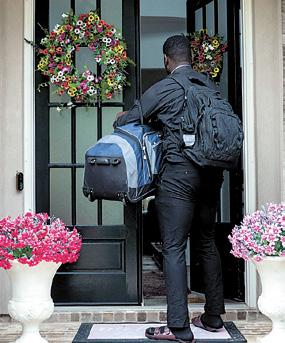
With a similar servant spirit, Father Bernard Oleru says he’s excited about his assignment as a first-time pastor, at St. Philip the Apostle Church in Statesville.
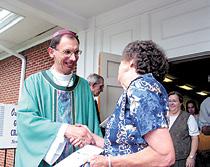
“This assignment came to me with great joy. It is an opportunity for me to serve God’s people in the Diocese of Charlotte…,” he says. “I must confess, that the parishioners of St. Philip have really helped me to settle in. Their love is amazing. I am looking forward to building a praying community of God’s people in charity, joy, and love for the sake of the Kingdom of God.”
Typically, pastors are assigned for an extended period, usually five or six years or more. Parochial vicars typically move more often, either to other parishes in need or to replace a retiring or reassigned pastor.
Priests’ formation is continuous and does not end with their ordination. In the first several years as a parochial vicar, they learn about parish and ministry operations, receive mentoring from senior priests and pastors, and they develop their ministry of serving the faithful.
“Every priest has an opportunity to develop skills and talents of his ministry in different assignments,” says Father Noah Carter, pastor of Holy Cross Parish in Kernersville. “This is especially true for newly ordained priests who serve as parochial vicars, assistants, or chaplains. Typically, they won’t serve in these positions for a long time. In different environments they’re able to really show their skills and their aptitude in particular ministries, and grow.”
Change can be challenging, especially when a beloved pastor is reassigned.
“For some, this process can cause a little anxiety, but this is normal,” says Father Julio Dominguez, vicar of Hispanic Ministry and member of the bishop’s priest personnel board. “It happens every year in our diocese and in dioceses around the world. It’s a tradition of the Church that priests are invited to move from one community to another, to help the bishop in the service of the diocese and the entire Christian community.”
Parishioners need not “cling solely to the priest they already know and with whom they have grown in their faith,” Father Dominguez says, “because the faith – the Church – are much bigger than the clergy.”
Bishop Jugis was ordained to the priesthood on June 12, 1983, by then Pope (now St.) John Paul II in St. Peter’s Basilica in Rome. Before he became bishop in 2003, he was the diocese’s judicial vicar and served at the following parishes:
n Holy Infant Parish in Reidsville
n Holy Spirit Parish in Denver
n Our Lady of Lourdes Parish in Monroe
n Queen of the Apostles Parish in Belmont
n Sacred Heart Parish in Salisbury
n St. Ann Parish in Charlotte
n St. John Neumann Parish in Charlotte
n St. Leo the Great Parish in WinstonSalem
n St. Mark Parish in Huntersville
n St. Patrick Cathedral in Charlotte
Just as a parish gained wisdom and comfort from a beloved priest, other communities will now benefit from his ministry, too.
“The new priest brings new expectations, new programs, new improvements,” he says. “Every priest has something to give to his parish. So, the change is very nice because it enriches the communities with the vast doctrine of the Church.”
Father Carter says over the course of his priesthood every assignment has helped him grow in his vocation.
“One assignment gave me experience in a parochial school, teaching and being part of the administration,” he says. “Another assignment had a very robust Hispanic community, and I began learning their cultures and customs and how they expect the Church to serve them. Little by little, as I moved from parish to parish, I learned and grew – piecing together the things that are needed to be well-rounded and ready to take on a parish as pastor.”
Yet priests understand that assignment changes can be difficult.
“It is often the case that both the priest and parishioners struggle with the reassignment of the pastor or parochial vicar because, over time, they develop relationships of comfortable trust with one another,” says Father Christian Cook, who moved last week from pastoring Immaculate Conception Parish in Hendersonville to St. Margaret Mary Parish in Swannanoa. “Those relationships take time to build, and so a priest transfer is tough because of a feeling of the loss of that relationship between the shepherd and sheep.”

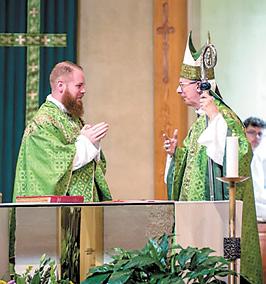

And, of course, the business of the parish doesn’t slow down even as clergy come and go.
“The new pastor comes in cold, and it takes time for him to get up to speed with his new parish. We move on a single day,” Father Cook says. “On Monday we are running one parish, and the very next, we land in a totally different parish. Not only are we trying to unpack and get settled in an unfamiliar house and town, but also trying to get a handle on the new Mass schedule, and keep up with (sacraments) that were scheduled prior to our arrival.”
With a smile, he adds: “It’s natural for parishioners to want to rush to their new pastor with their questions, their complaints, their needs and ideas. I would suggest that the biggest gift you can give your new pastor is a kind welcome, and some patience and prayers as he settles in.”
Caminando por Folly Beach, Carolina del Sur, vi unas escaleras que conducían desde una casa hasta el océano. Me imagino que cuando se construyeron, el escalón final descansaba ligeramente sobre la arena compacta y a pocos pasos del agua. Pero después de años de viento, lluvia y las corrientes del mar, sucesivas capas de arena enterraron los últimos escalones.
Mientras que algunos pueden ver el desafortunado efecto de la erosión, yo veo paralelismos entre esos pasos enterrados y mi propia vida espiritual. En algunos momentos de mi vida, antes de nacer, durante la inocencia de la infancia o en uno de esos momentos sacramentales, sentí que mi escalera estaba correctamente ordenada al nivel de la playa, con una transición suave desde el paso final hasta las delicias que yacían más allá. Podría deslizarme fácilmente de la rutina diaria a un pequeño pedazo de paraíso y regresar, renovado y refrescado.
Pero la vida golpea. Vienen las tormentas. Los vientos soplan. Las corrientes nos llevan de un lado a otro. Los granos de arena comienzan a acumularse y a enterrar esa transición suave entre el cielo y la tierra.
El crecimiento espiritual podría compararse con un proyecto de excavación. La oración, la meditación y alguna dirección espiritual serían las herramientas principales: las retroexcavadoras y las palas de la vida espiritual, por así decirlo. Con ellas, puedo limpiar las arenas de mi vida, que por diversas razones se han interpuesto entre mí y ese punto perfecto de contacto con lo divino.
En mi aprendizaje como director espiritual, los formadores e instructores enfatizaron “profundizar”.
La forma en que he visto esto como director espiritual es que “el dirigido” a menudo comienza hablando sobre su vida: trabajo, familia, hijos y matrimonio. Esto es como la primera capa de arena.
Debajo de esa capa, exploramos las emociones: frustración, alegría, ira, desconcierto... Debajo de eso, comenzamos a acercarnos al corazón, el lugar lleno de gracia donde el Espíritu está hablando más fuerte. Consideramos los temas más importantes como la vida y la muerte, el amor y el miedo, la soledad y la pertenencia.
Al redescubrir esa conexión perdida con ese santuario interior, exploramos la pregunta que encapsula todas las demás preguntas: “¿cómo era cuando esas escaleras descansaban suavemente en la playa?”, ¿cómo era cuando las arenas de la vida no se interponían entre tu conexión sin esfuerzo entre tus actividades diarias y Dios?
A veces, solo rememorar esos momentos es todo lo que necesito para “recordar” esa conexión sagrada entre el cielo y tierra que una vez existió y todavía existe debajo de unas pocas capas de arena. Una vez recordada, la pregunta es esta: ¿hacia dónde necesito apuntar mi pala?
¡Bendiciones en tu excavación espiritual de verano!
Izquierda: Participantes de ‘La Familia Emaús’ animan a los visitantes a integrarse a las actividades que se ofrecieron durante el festival de recaudación de fondos para continuar la construcción de su centro de retiros. Derecha: Estado actual de la construcción del pabellón principal de tres plantas que alojará una capilla, sala de conferencias y los servicios de cocina y comedor.

CÉSAR HURTADO rchurtado@charlottediocese.org

HICKORY — Gracias a los fondos recaudados en una actividad familiar por el Día del Padre, el Centro de Retiros que se construye gracias al esfuerzo de los miembros de la Familia Emaús, familiares y amigos simpatizantes del movimiento apostólico, ha tomado un nuevo impulso y ve próxima la culminación de la primera fase de la edificación. Al festival con danzas, música y platillos típicos, convocado en la Plaza Latina en Hickory bajo el lema ‘Ven, celebra en familia el Día del Padre y apoya la causa’, asistieron más de mil quinientas personas que, según relata Freddy García, uno de los dirigentes de La Familia Emaús, “se fueron contentas a casa después de disfrutar de bailes folclóricos, el arte de los grupos musicales invitados y hasta participar en un torneo soccer indoor”. García dijo que todas las expectativas de participación y recaudación de fondos fueron cubiertas. “Todos los alimentos fueron donados por las catorce comunidades que congrega la Familia Emaús, desde las montañas hasta Charlotte inclusive”.
García, feligrés de la parroquia San Luis Gonzaga en Hickory, explicó que el movimiento se expandió rápidamente en la zona montañosa de Carolina del Norte desde 2011, gracias a la inquietud del Padre Julio Domínguez, quien servía en ese entonces como párroco en la Iglesia San Francisco de Asís en Lenoir.

Desde ese año, y hasta la actualidad, rentan lugares en donde realizar los retiros. En 2015, gracias a las gestiones del Diácono Sigfrido Della Valle, se contactaron con un donante que les entregó un terreno de 2 acres con un edificio semi construido pero abandonado.
La vieja edificación debió de ser derruida, pero sus cimientos pudieron ser aprovechados para construir la nueva casa.
Inicialmente, los integrantes del movimiento aportaron su tesoro para los materiales y además su trabajo voluntario
los fines de semana. En las faenas de construcción y habilitación del terreno han participado tanto hombres como mujeres, todos integrantes de La Familia Emaús de varias comunidades de los vicariatos de Charlotte, Hickory, Salisbury, Boone, Asheville y Smoky Mountains.

El edificio, gracias también a la ayuda de arquitectos e ingenieros que donaron su trabajo, fue avanzando progresivamente hasta que la llegada de la pandemia de COVID-19 casi paralizó toda la iniciativa.
García cree que todo llegó de acuerdo con el tiempo de Dios. “Nosotros planeamos algo más pequeño, y luego fue necesario crecer para cumplir con los requerimientos e inspecciones de la Ciudad. Por ello, la construcción residencial pasó a ser comercial con obstáculos que debimos superar gracias a donantes que aparecieron providencialmente. Yo creo que Dios nos dijo ‘quiero algo más grande’”.
El proyecto en construcción, que se encuentra bastante adelantado, consta de un salón de conferencias en la primera planta. En el sótano se ubicará la cocina y comedor, y en el segundo piso se instalará la capilla. En una segunda fase de desarrollo, se planea que a la par del edificio puedan construirse dos dormitorios, uno para varones y otro para damas. La tercera y última fase contempla la construcción de un centro de reuniones al aire libre. García dijo que es el deseo de todos que el proyecto en su totalidad se concluya a fines de 2024. Tuvo un agradecimiento especial a Mike Lugo, parroquiano de la Iglesia Inmaculada Concepción en Forest City, quien donó el terreno y, a través de sus múltiples relaciones, estableció contactos con empresas de construcción y profesionales en la materia que han donado su trabajo al proyecto.
Si ha participado en un encuentro Emaús, se encuentra agradecido por lo que éste le ha aportado a su vida y desea realizar una donación, no dude en contactar por texto a Freddy García 828-962-0696 o el Diácono Sigfrido Della Valle 407-920-4036 por información.
EL DIÁCONO SCOTT D. GILFILLAN es director del Centro Católico de Conferencias en Hickory.
CHARLOTTE — Seis seminaristas de la Diócesis de Charlotte se presentaron ante el Obispo Peter Jugis el jueves 6 de julio en la Catedral San Patricio y afirmaron su deseo de avanzar en el camino hacia el sacerdocio.
Kolbe Flood, James Johnson IV, Patrick Martin, Emanuel Martínez, Connor White y Bailey Van Nosdall se graduaron recientemente del Seminario Universitario San José en Mount Holly y pasarán a estudiar en un seminario mayor este otoño.
La Misa especial, con el Rito de Admisión a la Candidatura para las Órdenes Sagradas, marcó un paso oficial para que los seminaristas se embarquen en un período de formación más especializado.
Durante su homilía, el Obispo Jugis señaló que las lecturas de Isaías, San Pablo y el Evangelio de Mateo para esta Misa se eligen especialmente para la ocasión, y todas ellas describen la respuesta al llamado de Dios a guiar a su pueblo.
En Isaías, capítulo seis, Dios pide que alguien sea su profeta, e Isaías responde: “Aquí estoy, Señor. ¡Envíame!”
“Podemos sentir el entusiasmo en la respuesta de Isaías, ‘¡Envíame!’ Él exclama”, dijo el Obispo Jugis a los jóvenes.
El obispo continuó: “Cuando entré al seminario en 1979, la Diócesis de Charlotte tenía solo siete años de antigüedad. Con recursos limitados, los seminaristas y sacerdotes aprendimos durante esos años que lo que se necesitaba de todos era un
espíritu de disponibilidad y adaptabilidad para hacer el trabajo. En otras palabras, el espíritu de Isaías”.
“Ahora, después de 51 años como diócesis, ese mismo espíritu es necesario a medida que la diócesis continúa su crecimiento fenomenal”.
“Ustedes, jóvenes que ahora van a ser candidatos a las órdenes sagradas, ya son siervos del Señor. Con sus vidas, dan testimonio de Cristo y de su Reino. Con el entusiasmo y deseo de Isaías, ustedes vienen hoy siguiendo su vocación a las órdenes sagradas”, dijo el obispo. “Ustedes hacen esto, como dice San Pablo en su carta a los Corintios, por el bien del Evangelio. Por su amor a Cristo, desean dar sus vidas al servicio de Él”.
“Y así, en esta Misa, cumplimos el mandato de Jesús, como escuchamos en el Evangelio según San Mateo, de pedirle al maestro que envíe obreros para su mies. Hacemos esto otorgándoles la bendición oficial de la Iglesia como candidatos, y pidiéndole al Señor que continúe formándolos para que se conviertan en Sus ministros sagrados” para “ayudar a guiar a las personas a Cristo”.
A través de la formación, dijo a los seis seminaristas, “han llegado al punto de hacer una declaración pública de su deseo de dedicarse al servicio de Dios y de los demás. Acogemos este deseo con alegría”.
El Obispo Jugis los alentó a continuar creciendo en la fe, esperanza y caridad a través de la oración y una exploración más profunda de su posible vocación como sacerdotes.
“Confiando en el Señor, todos los ayudaremos con nuestra caridad y oraciones”, dijo.
Los próximos pasos en la formación de los hombres serán los ministerios de lector, de acólito, la ordenación al diaconado de transición y, finalmente, la ordenación al sacerdocio.
La Diócesis de Charlotte ahora tiene 51 hombres en su creciente programa de seminaristas, y se esperan más solicitantes antes que comience el año escolar este otoño.
En sus comentarios, el Obispo Jugis dijo: “Agradecemos al buen Dios por las muchas maneras en que nos está bendiciendo”.
VICENTE CAPISTRANO
Especial para Catholic News Herald
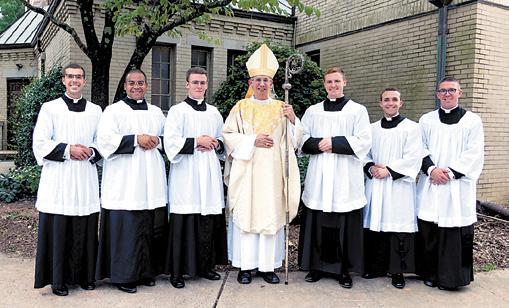
CHARLOTTE — La parroquia Nuestra Señora de Guadalupe en Charlotte realizó su jornada juvenil anual de tres días, donde 80 participantes de ambos sexos, entre los 18 y 30 años de edad, tuvieron un encuentro personal con su Iglesia, así como con Nuestro Señor Jesucristo, visto desde su propia realidad juvenil.
Los organizadores expresaron que los jóvenes llegaron con esperanza pero nerviosos al primer día del retiro. Algunos de ellos ya habían vivido retiros en el pasado, pero para otros la experiencia resultaba novedosa.
Asly Medina y Marcos Capistrano, de 20 y 19 años respectivamente, fueron los elegidos para coordinar el retiro de este año bajo el lema ‘Joven de acción, haz de tu vida una misión’, que abarcó temas tales como El hijo pródigo, Familia y sociedad, Perseverancia en la fe, Sexualidad, Tecnología y tiempo libre, y muchos otros más, siempre presentados por otros jóvenes adultos que prepararon el retiro por cerca de seis meses.
Los participantes disfrutaron con estos temas y, dentro de este espacio seguro, se sintieron a gusto de compartir sus propios testimonios y experiencias.
Este año, a diferencia de los anteriores, se añadió en las actividades la realización de una Adoración y Procesión Eucarística. Los jóvenes participaron en la oración a la naturaleza en presencia del Santísimo Sacramento, y tuvieron la oportunidad de dar gracias a Dios por el día y las pequeñas grandes cosas que se presentan en su diario vivir.
Después de la adoración y los cantos, todos acompañaron al Santísimo a la
Casa San Vicente, un espacio parroquial anexo, donde se había ubicado una capilla temporal que permaneció habilitada durante todo el retiro.
La Misa de clausura fue oficiada por el vicario parroquial, Padre Blas Lemos, el domingo a las 3:30 de la tarde. La celebración litúrgica fue testigo de la fe, fortaleza, esperanza y energía de los jóvenes.
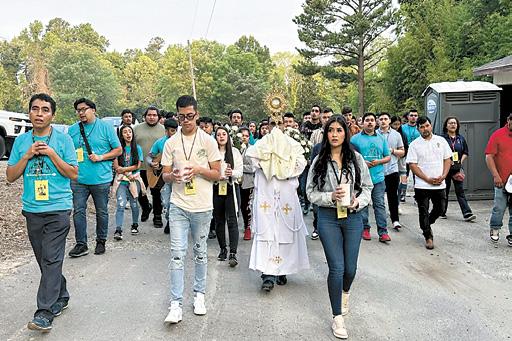
Los organizadores esperan que quienes vivieron el retiro continúen fortaleciendo su fe y ayuden a servir en la jornada juvenil del próximo año. Todos los jóvenes adultos están invitados a preservar su fe al continuar participando en la comunidad uniéndose a uno de los muchos ministerios, especialmente con el grupo de jóvenes adultos ‘Fruto de Fe’.
El Padre Hugo Medellín, vicario, dijo que
en la Iglesia Nuestra Señora de Guadalupe se trabaja en ministerios de familia que incluyen a niños, adolescentes, jóvenes, adultos y la tercera edad. “En este caso, buscamos interesar a los jóvenes adultos que se encuentran viviendo una etapa en la que están en búsqueda de lo que quieren para sus vidas”. Aclaró que luego del retiro continúa una etapa de seguimiento en la que se refuerza el conocimiento de su fe. La Jornada Juvenil del próximo año está programada para llevarse a cabo del 21 al 23 de junio. Las personas interesadas en unirse a esta comunidad de jóvenes activos, de entre 18 a 30 años, pueden presentarse en la Iglesia de Nuestra Señora de Guadalupe, 6212 Tuckaseegee Road, Charlotte, NC 28214, participar de la sesión e integrarse al grupo de jóvenes todos los jueves a las 7:30 de la tarde.
CESAR
HURTADO rchurtado@charlottediocese.orgCHARLOTTE — Bajo el tema “Yo estoy con ustedes todos los días” (Mateo 28:20), la Diócesis de Charlotte realizará su Congreso Eucarístico anual el próximo 8 y 9 de septiembre en el Centro de Convenciones de esta ciudad.
Este año, en alianza con el Año de Reavivamiento Eucarístico que promueve la Conferencia de Obispos Católicos de Estados Unidos, el Congreso será presentado por Kris Frank, director senior de estrategia y alcance de esta iniciativa.
Las actividades inician el viernes 8 a las 6:45 p.m. en la Sala A con la bienvenida y oración del Obispo Peter Jugis. Le seguirán las Vísperas Solemnes, procesión del Sagrado Sacramento a la Iglesia San Pedro y una sesión para universitarios presentada por la Hermana Ángela de Fátima Coelho, MD, ASM.
El sábado 9, a las 9 a.m., la Procesión Eucarística iniciará su recorrido desde la Iglesia San Pedro al Centro de Convenciones.
A las 10:15 a.m. el Obispo Peter Jugis presidirá la Adoración Eucarística y Homilía de Hora Santa en la Sala A, culminando con la bendición del Santísimo Sacramento. Tras la bienvenida, colecta y anuncios, se dará inicio a las sesiones.
El primer tema, ‘La Eucaristía, alimento nutritivo para la familia’, será presentado por el Padre Roberto García de la Mora, sacerdote de la Arquidiócesis de Guadalajara, México.
El P. García de la Mora, licenciado en Filosofía y Teología en el Seminario Diocesano de Guadalajara y en Derecho Canónico en la Universidad Gregoriana de Roma, Italia, se desempeñó como asesor del Encuentro Matrimonial Mundial durante 30 años, como profesor de Derecho
Nuevamente la Procesión Eucarística tomará las calles del centro de Charlotte mostrando la fe y devoción de los feligreses. El Congreso Eucarístico 2023 tendrá lugar el 8 y 9 de septiembre en el Centro de Convenciones de la Ciudad Reina.
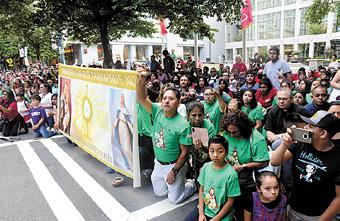
Canónico y formador del Seminario durante 13 años; y como pastor durante 13 años. Actualmente, es párroco del Expiatorio Eucarístico de Guadalajara y Director Espiritual de Adoración Nocturna de la Arquidiócesis de Guadalajara desde hace dos años.
A la 1:30 p.m., el Padre Miguel Bernal presentará el tema ‘Somos bilingües: nuestro primer idioma es el amor’. El P. Miguel Bernal fue ordenado sacerdote por la Arquidiócesis de Sevilla en 2001. Enfermero radiólogo, dejó su trabajo para ingresar al seminario en Sevilla, recibiendo la Licenciatura en Teología de la Facultad de Teología de la Compañía de Jesús en Granada. Fue capellán de hospital, párroco y profesor de teología en el
Instituto de la Santísima Virgen María. Tras su ordenación sacerdotal, obtuvo el título de Máster en Filosofía Moderna en Sevilla y una Licenciatura en Filosofía Práctica de la Pontificia Universidad Gregoriana de Roma, Italia. Actualmente, ministra en la Diócesis de Bridgeport, Connecticut.
Finalmente, a las 2:30 p.m., los Padres Ramiro Tijerino y Óscar Benavides, expondrán su ‘Testimonio de la fe en la tribulación’
Los P. Tijerino y Benavides, de Matagalpa, Nicaragua, se han mantenido firmes en su fe a pesar de la adversidad. Estaban entre los cientos de nicaragüenses que fueron arrestados y encarcelados por el presidente de Nicaragua, Daniel Ortega, por criticar al gobierno.
En ese país centroamericano, obispos y sacerdotes han sido intimidados y encarcelados, las procesiones religiosas públicas prohibidas, las estaciones de radio católicas cerradas. El embajador del Papa Francisco y las propias monjas Misioneras de la Caridad de la Madre Teresa han sido expulsadas.
El P. Ramiro se ha desempeñado como párroco y rector de la Universidad Juan Pablo II en Managua, la capital de Nicaragua. El Padre Oscar se ha desempeñado como párroco y como asesor del programa de Ministerio Juvenil de la diócesis de Matagalpa.
Ambos sacerdotes fueron detenidos en agosto pasado y sometidos a juicio, siendo sentenciados a 10 años en una infausta prisión en Managua.
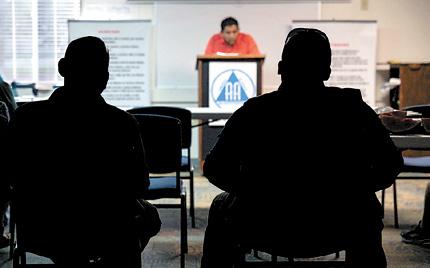
El pasado 9 de febrero, los dos fueron despojados de su ciudadanía nicaragüense, exiliados a Estados Unidos y recibidos en Charlotte.
Más online
En www.goeucharist.com : Encontrá información detallada sobre el congreso, horarios, cómo llegar, dónde estacionar y demás.
CÉSAR HURTADO rchurtado@charlottediocese.org
CONCORD — Las noches son una verdadera pesadilla para Edgar. “Me despierto llorando. Me acuerdo de lo que perdí, de mi hogar, de mi mujer. La busco tratando de abrazarla, pero no está, me dejó. Los fantasmas me visitan cada noche”, nos cuenta.
Sofonías tiene una enfermedad incurable, progresiva y mortal que lo ataca física, mental y espiritualmente. “Tengo una obsesión aunada a una alergia orgánica, una perversa enfermedad del alma”, dice.
Freddy tuvo una infancia dura. Sus padres lo dejaban encargado y creció sin amor. Ya de adulto, llegó al punto de querer quitarse la vida. Ahora piensa que nunca es tarde para curar ese fondo de sufrimiento, recuperarse y luego recobrar a su familia.
Tres historias diferentes, un mismo problema común: Edgar, Sofonías y Freddy son alcohólicos.
Pero estos hombres, una pequeña muestra del número de participantes del grupo ‘La alegría de vivir’ de Alcohólicos Anónimos que se reúne tres veces por semana en la Iglesia Santiago el Mayor en Concord, han encontrado una esperanza de rehabilitación para esta enfermedad incurable que destruye sus cuerpos, sus espíritus y sus familias.
El grupo, que en breve cumplirá su cuarto aniversario de trabajo en la parroquia, ve los frutos logrados en cada reunión a la que puntualmente asisten sus integrantes.
Para el Padre Fabio de Jesús Marín Morales C.Ss.R., director de los ministerios hispanos de la parroquia, el grupo es un gran aporte para la comunidad parroquial.
“Se les ve vivir con mayor alegría e intensidad los sacramentos, se ve también una gran transformación en sus vidas y las de sus familias. Se nota en las esposas, en los esposos, en los hijos, que dan testimonio del cambio ante la comunidad”.
“Aquí, con mucho cariño, se les recibe y apoya para que se mantengan firmes en este trabajo, en esta tarea de alejarse del alcoholismo”, añadió.
¿QUÉ
AA es la sigla de Alcohólicos Anónimos, una organización sin fines de lucro que nació en Akron, Ohio,
en 1935, como producto del trabajo de dos alcohólicos desahuciados, Bill W., un corredor de bolsa de Nueva York, y el Dr. Bob S., un cirujano de Akron. Desde allí se extendió a Nueva York, progresivamente a todo Estados Unidos y Canadá, para en 1971 alcanzar una escala mundial.
El programa tiene una base sencilla pero exitosa: un alcohólico que comparte su testimonio con otro puede ser una ayuda efectiva.
A través de 12 pasos y 12 tradiciones, los participantes van progresivamente reconociendo sus limitaciones y sus fortalezas en sesiones en las que aprenden de la enfermedad del alcoholismo y cómo luchar contra ella.
¡FELICES 24 HORAS!
AA no recluta miembros, AA es un lugar donde se deja de beber. Sofonías explica que el grupo es libre, no está afiliado a ninguna secta, organización o partido político, se mantiene con sus colaboraciones voluntarias, no impone reglas y propone una autodisciplina a sus miembros. “Venimos de la guerra, no podemos estar enmascarados. Aquí vengo yo a reconocer mi problema de alcoholismo, a darme cuenta quién soy y a corregir mis defectos. Pero, si le fallo a Dios, no a mí mismo ni a la sociedad, sé que Él me va a perdonar y, con su inmenso amor, me va a dar otra oportunidad. Pero esto no solo es para el que lo necesita, es para quien también lo quiere”.
TROY HULL | CATHOLIC NEWS HERALD
A través de 12 pasos y 12 tradiciones, los participantes del grupo de Alcohólicos Anónimos ‘La alegría de vivir’ buscan día a día rehacer sus vidas en beneficio de ellos mismos y sus familias. “Es un gran aporte para la comunidad”, dijo el Padre Fabio de Jesús Marín Morales, C.Ss.R., director de los ministerios hispanos de la parroquia Santiago el Mayor en Concord.
Hemos sido testigos de que es posible que los alcohólicos acepten que tienen un problema con la bebida, que puedan solucionarlo, que trabajen en reparar los daños, que entiendan que dependen de un poder superior y que está en sus manos ayudar a otros a salvar sus almas.
Un día sin alcohol es un logro. “Ayer es el pasado; mañana, quién sabe; hoy es el día más importante de mi vida, hoy libro la batalla, voy a mi reunión por mi recuperación. Las reuniones nos salvan. Aquí todos somos ganadores. ¡Felices 24 horas!”, dijo Óscar, otro integrante. Podríamos pasar días relatando a detalle cada una de las conmovedoras experiencias que pudimos escuchar de boca de los propios protagonistas de esta desgarradora realidad del alcoholismo y su lucha por rescatar sus vidas de esta enfermedad que destruye sus dignidades y almas.
Pero, sobre todo, hemos sido testigos de que nunca es tarde para llegar a Alcohólicos Anónimos, y que dejar de beber no es morir sino aprender a vivir.
Si tienes un problema con el alcohol, contacta al grupo AA ‘La Alegría de Vivir’. Lázaro (704) 701-9179, José (704) 490-9562, Gustavo (704) 491-0876.
Más online
En www.aa.org/es : Encontrará mayores detalles sobre Alcohólicos Anónimos
El nombre Santiago, proviene de las palabras Sant y Iacob. Porque su nombre en hebreo era Jacob. Los españoles en sus batallas gritaban: “Sant Iacob, ayúdanos”. Y de tanto repetir estas dos palabras, las unieron formando una sola: Santiago.
Fue uno de los doce apóstoles del Señor y hermano de San Juan evangelista. Se le llamaba el Mayor, para distinguirlo del otro apóstol, Santiago el Menor, que era más joven que él.
Con sus padres Zebedeo y Salomé vivía en la ciudad de Betsaida, junto al Mar de Galilea, donde tenían una pequeña empresa de pesca. Tenían obreros a su servicio, y su situación económica era bastante buena pues podían ausentarse del trabajo por varias semanas, como lo hizo su hermano Juan cuando estuvo una temporada en el Jordán escuchando a Juan Bautista.
Santiago formó parte del grupo de los tres preferidos de Jesús, junto con su hermano Juan y Simón Pedro. Después de presenciar la pesca milagrosa, al oír que Jesús les decía: “Desde ahora seréis pescadores de hombres”, dejó sus redes, familia, empresa pesquera y se fue con Jesucristo.
Presenció los grandes milagros de Cristo, y con Pedro y Juan estuvo presente en la Transfiguración del Señor y en su Oración en el Huerto de Getsemaní.
¿Por qué lo prefería tanto Jesús? Quizás porque era el más atrevido y valiente
JULIO 23-29
Domingo: Sabiduría 12:13, 16-19, Romanos 8:26-27, Mateo 13:24-43; Lunes (San Chárbel Makhluf): Éxodo
14:5-18, Mateo 12:38-42;
Martes (Santiago Apóstol):
2 Corintios 4:7-15, Mateo 20:20-28; Miércoles (San Joaquín y Santa Ana):
Éxodo 16:1-5, 9-15, Mateo
13:1-9; Jueves: Éxodo 19:1-2, 9-11, 16-20, Mateo 13:10-17; Viernes: Éxodo 20:1-17, Mateo
13:18-23; Sábado (Santas Marta y María, San Lázaro): Éxodo 24:3-8, Juan 11:19-27
para declararse amigo y seguidor del Redentor, o porque iba a ser el primero que derramaría su sangre por proclamar su fe en Jesucristo.
Cuenta el santo Evangelio que una vez al pasar Jesús con sus discípulos por un pueblo de Samaria, la gente no quiso proporcionarles ningún alimento y que Santiago y Juan le pidieron a Jesús que hiciera llover fuego del cielo. Cristo los regañó y recordó que Él no había venido a hacer daño a nadie sino a salvar al mayor número posible de personas.
En otra ocasión, Santiago y Juan comisionaron a Salomé, su madre, para que fuera a pedirle a Jesús que en el día de su gloria los colocara a ellos dos en los primeros puestos: uno a la derecha y otro a la izquierda. Jesús les dijo: “¿Serán capaces de beber el cáliz de amargura que yo voy a beber?” Ellos le dijeron: “Sí somos capaces”. Cristo añadió: “El cáliz de amargura sí lo beberán, pero el ocupar los primeros puestos no me corresponde a Mí el concederlo, sino que esos puestos son para aquellos para quienes los tiene reservado mi Padre Celestial”.
Después de la Ascención de Jesús, Santiago el Mayor se distinguió como una de las principales figuras entre el grupo de los Apóstoles. Por eso, cuando el rey Herodes Agripa se propuso acabar con los seguidores de Cristo, lo primero que hizo fue mandar cortarle la cabeza a Santiago y encarcelar a Pedro. El hijo de Zebedeo tuvo
JULIO 30-AGOSTO 5
Domingo: 1 Reyes 3:5, 7-12, Romanos 8:28-30, Mateo 13:44-52; Lunes (San Ignacio de Loyola): Éxodo 32:15-24, 30-34, Mateo 13:31-35; Martes (San Alfonso María de Ligorio): Éxodo 33:7-11, 34:5-9, 28, Mateo 13:36-43; Miércoles: Éxodo 34:29-35, Mateo 13:44-46; Jueves: Éxodo 40:16-21, 34-38, Mateo 13:47-53; Viernes (San Juan Vianney):
Levítico 23:1, 4-11, 15-16, 27, 34-37, Mateo 13:54-58;
Sábado: Levítico 25:1, 8-17, Mateo 14:1-12
AGOSTO 6-12
Domingo (Fiesta de la Transfiguración del Señor): Deuteronomio 7:9-10, 13-14,
2 Pedro 1:16-19, Mateo 17:1-9; Lunes (San Cayetano, San Sixto II Papa): Números 11:415, Mateo 14:13-21; Martes (Santo Domingo presbítero): Números 12:1-13, Mateo 14:2236; Miércoles: Números 13: 1-2, 25–14:1, 26-29, 34-35, Mateo 15:21-28; Jueves (San Lorenzo, diácono y mártir):
2 Corintios 9:6-10, Juan 12:2426; Viernes (Santa Clara Virgen): Deuteronomio 4:3240, Mateo 16:24-28; Sábado (Santa Juana Francisca de Chantal): Deuteronomio 6:413, Mateo 17:14-20
Please pray for the following deacons who died during the month of July
el honor de ser el primero de los apóstoles que derramó su sangre por proclamar la religión de Jesús Resucitado.
Antiguas tradiciones dicen que Santiago alcanzó a ir hasta España a evangelizar. Y desde el siglo IX se cree que su cuerpo se encuentra en la catedral de Compostela, Ciudad del norte de España.
Sponsored by the Knights of Columbus www.kofcnc.org
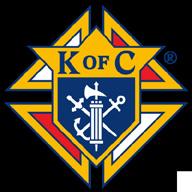
‘El Apóstol Santiago a caballo, o Santiago Matamoros’, 1649. Óleo sobre lienzo de Francisco Camilo (Madrid 1615-1673), pintor florentino que participó en la decoración del Monasterio del Escorial.
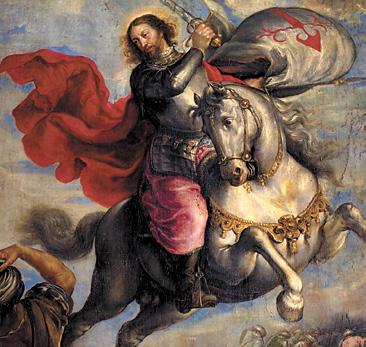
IMAGEN CORTESÍA DEL MUSEO DEL PRADO, MADRID, ESPAÑA
Hasta ese santuario han llegado miles y miles de peregrinos que han conseguido maravillosos favores del cielo.
Es patrono de España y de su caballería, así como de Galicia. Los españoles lo han invocado en momentos de grandes peligros y han sentido su poderosa protección.
— Condensado de ACI Prensa
The Roman Catholic Diocese of Charlotte is currently accepting resumes for the position of “Property & Facilities Manager” within the Office of Diocesan Properties & Real Estate. The Property & Facilities Manager is responsible for the oversight, performance, operation, and facility management of all Tier 1 properties and vehicles. While maintaining a high level of expertise and professionalism, the Property & Facilities Manager will address both internal and external issues impacting facility operations, including budgetary oversight, preventative maintenance, overseeing plant improvements, and responding to and resolving Diocesan/Location facility requests or concerns.
REQUIREMENTS INCLUDE:
• Bachelor’s degree from accredited college/university required.
• 5+ years min. experience managing multi-building campuses and operations is preferred.
• IFMA/CFM designation strongly preferred.
• A valid driver’s license is required.
• Proficiency in Microsoft Office products including Word, Excel, PowerPoint, and Outlook
• Strong proficiency in preventative maintenance/work order systems and processes.
• Ability to read and interpret Architectural and Engineering drawings.
• Strong inter-personal communication skills – both written and verbal.
• Strong critical thinking and problem-solving skills.
• Ability to work both independently and with a team.
PLEASE SUBMIT A COVER LETTER, RESUME AND SALARY HISTORY TO:
Director of Properties & Real Estate
Roman Catholic Diocese of Charlotte 1123 South Church Street Charlotte, NC 28203
Or email directly to PropDirector@RCDOC.org.
WASHINGTON, D.C. — U.S. House lawmakers called the global status of religious liberty “dire” during a hearing July 18, citing concerns across the globe from China to Nicaragua.
At a hearing of the Subcommittee on Global Health, Global Human Rights and International Organizations titled, “The Dire State of Religious Freedom Around the World,” lawmakers identified several countries where religious freedom is “under serious assault,” subcommittee chairman Rep. Chris Smith, R-N.J., said.
“Tragically, billions of people around the world, half of the world’s population, are not able to practice their faith freely,” Smith said. “Many are persecuted by oppressive governments or extremist groups – attacked, tortured, jailed, and even slaughtered for their beliefs.”
Some of the countries identified by lawmakers on the panel include China, where Smith said the “Chinese Communist Party is committing horrific crimes against believers, including genocide against Uyghur Muslims,” and Nigeria, where Smith said he has “seen firsthand the aftermath of Boko Haram’s destruction of churches and mosques.”
“While on paper Nigeria has robust protections for all religions, violations
of religious freedom are escalating,” he said. “Extremist groups like Boko Haram and ISIS commit indiscriminate violence against those they consider to be infidels. In the Middle Belt, Fulani Muslim extremists target and kill Christian farmers in brutal raids.”
Smith also took aim at “the Ortega regime’s brutal persecution of the Church in Nicaragua,” referencing the committee’s earlier examination of what it called Nicaraguan President Daniel Ortega’s antiCatholic persecution.
“I remain deeply concerned for Bishop Álvarez, who was recently released only to be rearrested for bravely refusing to leave his country,” Smith said in reference to Bishop Rolando Álvarez, who was sentenced in February to 26 years in prison for refusing to be deported to the U.S. with more than 200 other Nicaraguan political prisoners.
“The Ortega regime is attempting to silence the Catholic Church as the single most important independent institution remaining in Nicaragua, but it will not succeed,” Smith continued. “I am committed to doing everything possible to urge the release of all Nicaraguans imprisoned for their faith.”
“The challenge we face today is clear: to protect and expand freedom of conscience, the ability to freely believe or not to believe, in the face of the forces
of authoritarianism and exclusion,” Rep. Susan Wild, D-Pa., said during remarks at the hearing. She noted these forces “have gained momentum in far too many corners of the world, including right here at home.”
“When authoritarian forces attempt to use religion as a weapon to target specific groups of people, or to target our multiracial, multicultural democracy itself,” she said, “let us reject those forces with one voice across religious, political and social lines.”
Smith, who is Catholic, said religious liberty is “one of America’s founding ideals, a cornerstone of our democracy, and it is an internationally recognized human right.” according to the dictates of one’s own
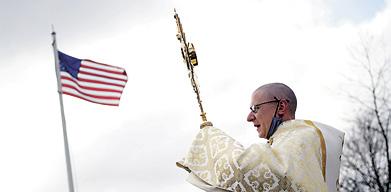
the Blessed Sacrament as he leads a Eucharistic procession in observance of Religious Freedom Day.
conscience,” he said. “This God-given right – like all fundamental human rights – flows from the innate dignity and value of every human being, and it deserves to be protected everywhere -- without exception.” Promoting religious freedom, he said, is a “pillar of U.S. foreign policy.”
“Assaults on religious freedom are a major threat to U.S. national security. The worst violators of religious freedom are often the biggest threats to our nation,” he said. “Authoritarianism is on the rise, with oppressive governments cracking down
Are you 70 ½ years or older? Unlock your potential to make a difference.
An IRA rollover gift to your parish, the diocese, Catholic school, agency, or the Foundation provides meaningful support without impacting your checkbook, and can maximize your giving potential.
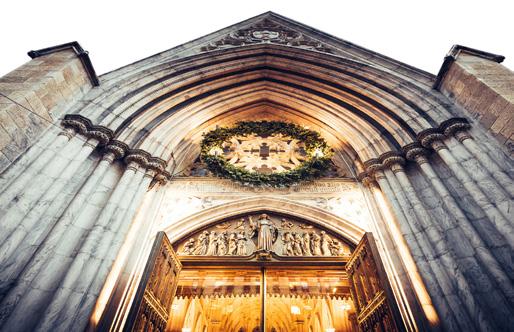
For more information, go to www.charlottediocese.givingplan.net or call Gina Rhodes at 704/370-3364. Foundation of the Diocese of Charlotte
This position is responsible for sourcing, recruiting, training and supervising volunteers to serve MiraVia's programs

Representing MiraVia at community and some public speaking will be required
Based out of the Charlotte location, this position will also serve as the front office representative and welcome clients, visitors and donors, and provide program support by receiving and processing donated items during office hours
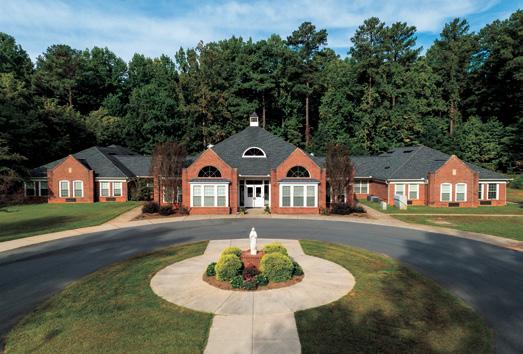
Requirements:
High School Diploma
Bilingual abilities in English and Spanish are preferred but not required
INDIANAPOLIS — A federal appeals court ruled July 13 that a Catholic high school and the Archdiocese of Indianapolis have a constitutional right to hire staff who will uphold core religious teachings. The case, Fitzgerald v. Roncalli High School and Archdiocese of Indianapolis, involved a former co-director of guidance at a Catholic school who sued the school and the Archdiocese of Indianapolis after her contract was not renewed because she entered a same-sex union in violation of her contract and Catholic teaching. “Today’s ruling is common-sense: decisions about who conveys the Catholic faith to Catholic school children are for the Church, not the government,” said Joseph Davis, counsel at the Becket Fund for Religious Liberty, which represented the defendant. “Many parents entrust their children to religious schools precisely because those schools help to pass on the faith, and this victory ensures they remain free to do so,” he said in a statement about the ruling. In 2018, Shelly Fitzgerald, former co-director of guidance at Roncalli High School for nearly 15 years, had her employment terminated by the school after she confirmed that she was in a same-sex union. School officials said her conduct was prohibited by the agreement she signed with Roncalli and the school declined to renew her contract for the following year.
The Diocese of Charlotte faces a similar legal claim. A former Charlotte Catholic substitute teacher sued after he was removed from the school’s call list for publishing on Facebook that he planned to marry his male partner. The teacher won in federal district court, but the diocese appealed to the Fourth Circuit Court of Appeals, arguing the diocese has a right to hire staff who will uphold religious teachings about marriage and other core beliefs.


DES MOINES — An Iowa judge on July 17 issued a preliminary injunction temporarily blocking the state’s new “heartbeat” abortion ban, which prohibits most abortions after about six weeks of pregnancy, while a legal challenge to that law moves forward. The injunction comes just days after Republican Gov. Kim Reynolds signed the measure into law at a political conference hosted by a prominent evangelical Christian group in the state. Reynolds signed the bill July 14 during an on-stage presentation at the Family Leadership Summit, telling those in attendance that “all life is precious and worthy of the protection of our laws.” The new law prohibits nearly all abortions once cardiac activity can be detected, around six weeks of pregnancy. But, with enforcement of the law blocked, Iowa in effect reverts to its previous law permitting abortion up to 20 weeks of pregnancy. Polk County District Court Judge Joseph Seidlin’s order blocking enforcement of the law stated the court “believes it must follow current Iowa Supreme Court precedent and preserve the status quo ante while this litigation moves forward.” The Iowa Catholic bishops have supported the law’s enactment, stating July 13, “Human life is precious and should be protected in our laws to the greatest extent possible.”

WASHINGTON, D.C. — President Joe Biden defended what he called a “very difficult decision” to provide cluster munitions to Ukraine amid Russia’s invasion of that country, weapons the Holy See opposes. In an interview on CNN’s “Fareed Zakaria GPS” that aired July 9, Biden said Ukraine needs the weapons to fend off Russian President Vladimir Putin’s invasion, and that he discussed his decision both with allies and with congressional lawmakers. Cluster munitions are air-dropped or ground-launched explosives that contain smaller submunitions, which increase the blast radius and the potential casualties and damage to physical structures. Despite Ukraine’s just cause to defend itself, one Catholic expert
said, the church opposes cluster munitions themselves. Mary Ellen O’Connell, a professor at Notre Dame Law School who specializes in international law and conflict resolution, told OSV News that “the Catholic Church is in full support of the total ban on cluster munitions” due to its effects on civilians, including long after the conflict. “Cluster munitions cannot discriminate between civilians and fighters,” O’Connell said. “Unexploded bomblets may kill civilians weeks, months, or years after a battle.” She suggested the U.S. and its allies should dig deeper into their own stockpiles of artillery shells, because an “unlawful weapon is never permissible to use because of military necessity.” In a July 14 statement, Bishop David J. Malloy of Rockford, Illinois, chairman of the U.S. Conference of Catholic Bishops’ Committee on International Justice and Peace, also raised concern about the use of cluster munitions.
OSV NEWS
VATICAN CITY — Pope Francis named 21 new cardinals, including U.S.-born Archbishop Robert F. Prevost, who took the helm at the Dicastery for Bishops in April, and French Archbishop Christophe Pierre, the apostolic nuncio to the United States.
The pope announced the names after his recitation of the Angelus with the faithful in St. Peter’s Square July 9. He said he would formally install the cardinals during a special consistory at the Vatican Sept. 30.
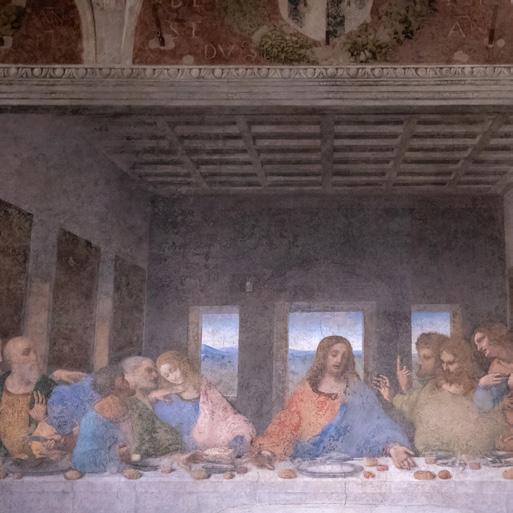
Cardinal-designate Prevost expressed his surprise and joy upon hearing the announcement, he said in an interview with Vatican News July 10.
“Certainly I felt happy for the recognition of the mission that has been entrusted to me – which is a very beautiful thing – and at the same time I thought with reverence and holy fear: I hope I can respond to what the pope is asking of me. It is an enormous responsibility, like when he called me to Rome as prefect,” he said in Italian.
“I see it as the continuation of a mission that the pope has decided to give me,” he added.
Speaking in English, Cardinal-designate Prevost said it is not a coincidence that Pope Francis scheduled the consistory before the start of the first general assembly of the synod on synodality, saying he is firmly convinced that “all of us are called to walk together.”
Chiclayo, Peru, for more than eight years before being appointed to lead the Vatican body responsible for recommending to the pope candidates to fill the office of bishop in many of the Latin-rite dioceses of the world. Recommendations made by the dicastery are typically approved by the pope. Archbishop Prevost has been a member of the dicastery since November 2020.
He also oversees the Pontifical Commission for Latin America, established in 1958 by Pope Pius XII to study the Church in Latin America, where nearly 40% of the world’s Catholics reside.
The cardinal-designate holds degrees from Villanova University in Pennsylvania and the Catholic Theological Union in Chicago and a doctorate from the Pontifical University of St. Thomas Aquinas in Rome. An Augustinian friar, he joined the Augustinian mission in Peru in 1985 and largely worked in the country until 1999, when he was elected head of the Augustinians’ Chicago-based province. From 2001 to 2013, he served as prior general of the worldwide order.
In 2014, Pope Francis named him bishop of Chiclayo, in northern Peru, and the pope asked him also to be apostolic administrator of Callao, Peru, from April 2020 to May 2021. The pope then appointed him to succeed the retiring Canadian Cardinal Marc Ouellet as prefect of the Dicastery for Bishops in early 2023.
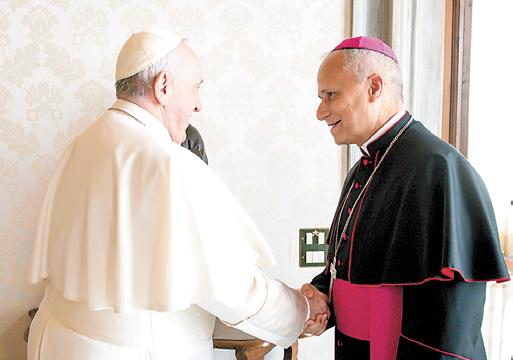
The new cardinals represent more than a dozen countries on five continents. Three of the new cardinals are current Vatican officials, three are current or retired apostolic nuncios, 13 are current or retired heads of archdioceses around the world, one is a rector major of the Salesians and one is a 96-year-old confessor in Buenos Aires. Six belong to religious orders; two of them are Jesuits.
Continuing a papal custom, among the new cardinals were three churchmen – two archbishops and a Capuchin Franciscan priest – over the age of 80, whom Pope Francis said he wanted to honor because they were particularly deserving due to “their service to the church.” Being over the age of 80, they are ineligible to vote in a conclave.
After the new cardinals are installed in late September, there will be 137 potential voters. The total membership of the College of Cardinals is expected to be 243.
The nomination of Cardinal-designate Prevost brings to 18 the number of U.S. cardinals; after the consistory, the U.S. contingent will include 11 potential papal electors.
The September ceremony will mark the ninth time Pope Francis has created cardinals since his election to the papacy in March 2013. After the ceremony Sept. 30, he will have created a total of 131 new cardinals in that College of Cardinals, which would make up about 54% of the total college and 72% of potential electors.
With the addition of six new cardinals under the age of 60, the average age of cardinal electors will get one year younger, going from today’s average age of 72 years 8 months to 71 years 6 months. Cardinaldesignate Alves Aguiar of Lisbon, 49, will be just six months older than the youngest elector, Cardinal Giorgio Marengo of Ulaanbaatar, Mongolia, 49.
Cardinal-designate Prevost, 67, was born in Chicago and had served as bishop of
Cardinal-designate Pierre, 77, was born in Rennes, France. Ordained to the priesthood in 1970, he served as apostolic nuncio to Haiti, Uganda and Mexico until Pope Francis named him nuncio to the United States in 2016.
Archbishop Timothy P. Broglio of Military Services, USA, and president of the U.S. Conference of Catholic Bishops, offered his congratulations and prayers to the new cardinals on behalf of the bishops of the United States July 9.
“Please join me in praying for Cardinal-designate Prevost and Cardinaldesignate Pierre as they continue their lives of service to the universal Church,” Archbishop Broglio said. “For the Church in the United States, their ministry has been a true blessing. Our episcopal conference rejoices in this sign of recognition of these distinguished churchmen.”
Before he read the 21 names, Pope Francis told the estimated 15,000 people in St. Peter’s Square the diversity of the new cardinals “expresses the universality of the Church, which continues to proclaim God’s merciful love to all people on Earth.”
The order in which the cardinals are announced determines their seniority in the College of Cardinals, which has little practical effect except in liturgical processions.
Here is the list of the new cardinals:
n U.S.-born Archbishop Robert F. Prevost, prefect of the Dicastery for Bishops, 67.
n Italian Archbishop Claudio Gugerotti, prefect of the Dicastery for Eastern Churches, 67.
n Argentine Archbishop Víctor Manuel Fernández of La Plata, Argentina, incoming prefect of the Dicastery for the Doctrine of the Faith. He will turn 61 July 18.
n Swiss Archbishop Emil Paul Tscherrig, the apostolic nuncio to Argentina, 76.
n French Archbishop Christophe Pierre, the apostolic nuncio to the United States, 77.
n Italian Archbishop Pierbattista Pizzaballa, Latin patriarch of Jerusalem, 58.
n South African Archbishop Stephen Brislin of Cape Town, 66.
n Argentine Archbishop Ángel Sixto Rossi of Córdoba, 64. He is professed with the Society of Jesus.
n Colombian Archbishop Luis José Rueda Aparicio of Bogotá, 61.
n Polish Archbishop Grzegorz Rys of Lódz, 59.
n South Sudanese Archbishop Stephen Ameyu Martin Mulla of Juba, 59.
n Spanish Archbishop José Cobo Cano of Madrid, 57.
n Tanzanian Archbishop Protase Rugambwa, coadjutor archbishop of Tabora, 63.
n Malaysian Bishop Sebastian Francis of Penang, Malaysia, 71.
n Bishop Stephen Chow Sau-yan of Hong Kong, 63. Born in Hong Kong, he is professed with the Society of Jesus.
n Bishop François-Xavier Bustillo of Ajaccio in Corsica, France, 54. Born in Spain, he is professed with the Conventual Franciscans.
n Portuguese Auxiliary Bishop Américo Alves Aguiar of Lisbon, 49.
n Spain-born Salesian Father Ángel Fernández Artime, rector major of the Salesians, 62.
n Italian Archbishop Agostino Marchetto, a retired papal nuncio, a former curial official and a respected
For the latest news 24/7: catholicnewsherald.com

VATICAN CITY — Pope Francis has rectified an irregularly appointed bishop in China for the “greater good of the diocese,” said Cardinal Pietro Parolin, Vatican secretary of state. “The Holy Father has appointed Bishop Joseph Shen Bin as bishop of Shanghai, in continental China, transferring him from the Diocese of Haimen,” the Vatican announced July 15. Bishop Shen, 53, had been appointed to the Diocese of Haimen in 2010 “with the consent of the two parties,” that is, China and the Holy See, the announcement said. However, he had been transferred to the Diocese of Shanghai by Chinese authorities in April without Vatican agreement and in disregard for a joint agreement between the Vatican and government of China. Cardinal Parolin told Vatican Media July 15 that Pope Francis “decided nevertheless to rectify the canonical irregularity created in Shanghai, in view of the greater good of the diocese and the fruitful exercise of the bishop’s pastoral ministry.” The pope’s intention, he said, is “fundamentally pastoral” so as to allow Bishop Shen, who is an “esteemed shepherd,” to work with “greater serenity in order to promote evangelization and foster ecclesial communion.”
MANAGUA, Nicaragua — Nicaraguans overwhelmingly disapprove of the conviction and imprisonment of Bishop Rolando Álvarez of Matagalpa, according to a survey in the increasingly
o er outpatient rehabilitation services in addition to our existing inpatient o erings. We take a multidisciplinary approach to healing and recovery by incorporating a personalized plan that includes physical, occupational and speech therapy. erapy services are available seven days a week, and progress is monitored daily.
to Bishop Álvarez, after being accused of treason. A surprising 56% of Sandinista supporters viewed the sentence unfavorably, according to the poll, which was conducted in mid-June. “He is the moral reserve of an entire people. … His pain, his kidnapping, his unjust imprisonment is the picture of what Nicaragua lives,” a Nicaraguan priest living in exile said of Bishop Álvarez. “He is loved for his conviction, his firmness and his love for God and the people.” The poll was published amid press reports of Bishop Álvarez being moved from the notorious Modelo prison and prepared for exile. The reports, which were first published in independent Nicaraguan media outlets and Reuters, cited ecclesial and diplomatic sources saying the bishop had left the prison on July 3 and was being held in the installations of the Nicaraguan bishops’ conference. Bishop Álvarez, however, refused to leave the country, according to Nicaraguan news organization Confidencial. He was returned to prison July 5, the news outlet reported. The chairman of the U.S. bishops’ international policy committee urged prayers for the bishop and called for his release.
WARSAW — Church leaders in Ukraine and Poland have urged “reconciliation and unity” between their countries in the face of Russian aggression as they marked the anniversary of a wave of wartime massacres in Volhynia region. Throughout the month of July, reconciliation prayers are held in places – often in the middle of farm fields – where entire villages vanished in 1943. May “all those who still carry the wounds of those events in their hearts open themselves to the liberating and healing power of forgiveness, breaking the chains of hatred and revenge,” said bishops from Ukraine’s Greek and Latin Catholic churches. The appeal was published July 10 to mark 80 years since the 1943 “Volhynia Slaughter,” which saw up to 100,000 Polish civilians murdered by Ukrainian nationalists, prompting 15,000 revenge killings by Polish partisans – on a much smaller scale, however. It said Catholic bishops in both countries took a “major step” toward reconciliation with joint letters of mutual forgiveness in 2005 and 2013, but were conscious that “further healing” was needed to ensure memories of “brutal” past violence would no longer “destroy future generations.”
e Lillian Congdon Transitional Rehab Center has 24 private, one-bedroom suites. e brand-new facility features ne dining, a state-of-the-art gym, Kore Balance for assessments, Never2Late for cognitive training and standing tolerance, an outdoor therapeutic space, POCket Pro for exercises at home and more.
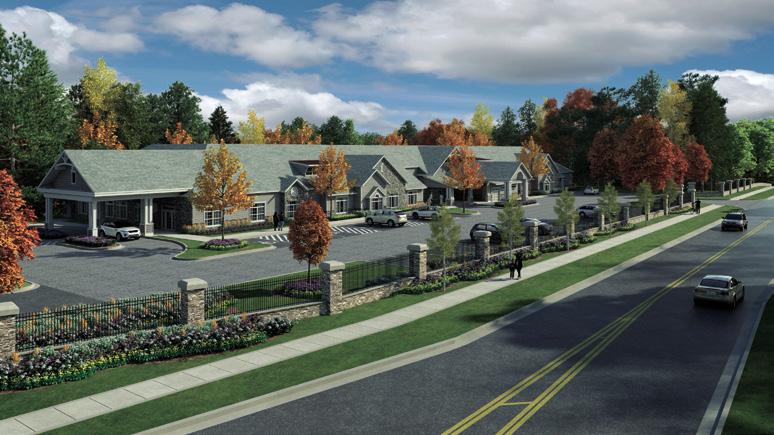
“You are what you eat,” my mother said. She encouraged me to eat good food so that I would live a healthy life. Mothers continue to tell their children, “You are what you eat.”
Long before your mother or mine voiced these words, St. Augustine taught that in the Eucharist we become what we receive. Every time we receive Communion, we become the Body of Christ.
When we receive the Eucharist, we are remade, rebuilt, transformed. We become what we eat.
When the priest, deacon or Eucharistic minister shows us the Host and says, “the Body of Christ,” we respond “Amen,” signifying not only that “we believe this is Christ” but also our conviction that we as the Church are His Body in the world.
The Eucharist, we Catholics believe, is the summit of our worship of God and the source of all the life-giving actions that we perform individually or as the Church. It’s not principally our allegiance to the pope as head of the Church that makes us Catholic. It is, rather, our presence here, Sunday after Sunday, and our reception here, Sunday after Sunday, of the Body and Blood of Christ.
“We become what we receive in the Eucharist” is a consoling and life-affirming truth of Catholic faith. We heard these words from St. Paul’s first letter to the Corinthians: “Brothers and sisters: The cup of blessing that we bless, is it not a participation in the blood of Christ? The bread that we break, is it not a participation in the body of Christ? Because the loaf of bread is one, we, though many, are one body, for we all partake of the one loaf.”
But now the going gets tough!
We hear in John’s Gospel words that repelled most of Jesus’ own followers – words that continue to repel many persons today:
“The Jews quarreled among themselves, saying, ‘How can this man give us his flesh to eat?’ Jesus said to them, ‘Amen, amen, I say to you, unless you eat the flesh of the Son of Man and drink his blood, you do not have life within you. Whoever eats my flesh and drinks my blood has eternal life.”
This sounds so much like cannibalism that it revolts some. Many Catholics find it hard to understand and accept. Yet Jesus says clearly and unequivocally: The host IS my body! The cup holds my blood!
The Eucharist is not a metaphor or a symbol. As the Catholic author Flannery O’Connor famously exclaimed, “Well, if it’s just a symbol, the hell with it.” The Eucharist is the Real Presence of Christ. It emphatically is not a symbol of Christ’s presence with us. It is the reality of Christ among us.
We eat his flesh and drink His blood, and we ourselves become the Real Presence of Christ in the world. This is a hard saying – let me briefly try to explain.
Things can be real in different ways: This candle on the ambo is a real thing. The nervous feeling that I have right now, and the bored feeling you have right now are real feelings. What we might call “conditions of world,”


As we celebrate National Family Planning Awareness Week beginning July 23, I remember back a few years ago, when I had the opportunity to spend time with some married friends as they awaited the birth of their baby boy. As the mother went into labor, I was struck by the shared sense of awe that permeated the moment.
Learn more
At www.eucharisticrevival.org : Find Church resources, videos, educational materials, prayers and more at the National Eucharistic Revival movement’s website – designed to restore understanding and devotion to the Eucharist

relationships among things, can be real. “The sky is overcast,” describes an actuality.
Likewise, there are sacramental realities in which Christ enters some physically real object in a different and deeper than ordinary way. In the sacraments God’s presence, whether in water, bread, wine or oil, creates a new reality. Not by magic, but by a divine love so generous that it generates something new and dazzling from something plain and simple.
In baptism, through water we die and rise sacramentally with Christ and become something new. We become Christian. In the sacrament of matrimony through the reality of marital intimacy, two Christians become one flesh in Christ.
In the same way, in the Eucharist Jesus becomes fully present in ordinary bread and wine, creating new reality: the intimate union that God wants with human beings, with you and with me.
Filled with love and hugging their infants tightly, mothers say, “I could just eat you up!” Jesus, filled with love and hugging us closely in communion, says, “I want you to eat me up!” Why? Because “This is my flesh for the life of the world.” We become what we receive. We become the reality of Christ in and for the world.
As the Body of Christ, we feed the world as He fed the 5,000; we heal the world as He gave sight to the blind man; we bring peace to the world as He did by dying and rising.
Therefore, if you believe with St. Augustine that we become what we receive, make a throne of your hand or tongue at Communion and, affirm “Amen!” Then take and eat the Body of Christ. Affirm “Yes. This IS the Body and Blood of Christ,” and “Yes! We are (with all our felicities, faults and foibles) the Body of Christ given for the world.”
We were waiting to meet a new person, a new member of the family. Each person in this family would be transformed by the gift of gaining a new son, brother, nephew or grandson.
It struck me that in an especially profound way, the lives of this husband and wife would be tied together more deeply by the experience of becoming a mother and father once again. This child was a fruit of the love they pledged when they first gave themselves to one another in marriage at the altar.
During the celebration of a wedding, before the vows, the priest or deacon asks the couple if they will “accept children lovingly from God and bring them up according to the law of Christ and His Church.”
The couple must answer “yes” to celebrate a valid marriage.
To truly give oneself to one’s spouse is to offer the gift of making the other a mother or father. To fully accept one’s spouse means to accept their capacity to make you a mother or father through the gift of self.
This openness to having children unites the couple in new and profound ways. Being a mother or father is forever, and ties the lives of a man and woman together forever. The deeper bond created by an openness to new life allows the couple’s love to grow. It allows them to discover their love is not only for themselves but is meant to be shared with new persons who are the fruit of their union.
St. John Paul II wrote “the fundamental task of the family is to serve life” and that through bearing children, mother and father have the privilege of passing on “God’s original blessing,” the divine image, to future generations. This blessing is passed on when the husband and wife come together in sexual union, which serves as a renewal of the “yes” they spoke in their marriage vows.
Any action that deliberately separates a couple from their vows of unity and openness to life – such as the use of artificial contraception – turns their “yes” into a “no,” and contradicts their marriage vows.
The use of artificial contraception is directly opposed to the call to husband and wife to be “at the service
of life” in their marriage. Withholding the openness to life also profoundly alters their personal relationship.
Contraception rejects a spouse’s potential to become a mother or father. It withholds rather than offers this gift to the other. To reject an openness to life not only modifies the act of sexual bonding, but rejects a profound part of the other person.
It is to protect both the unity and the fruitfulness of married love that the Church has always opposed the use of artificial contraception, instead favoring the use of Natural Family Planning (NFP) methods to aid married couples as they discern the decision to have more children or to pause for a certain or indefinite period of time.
The “yes” to life vowed by husband and wife embraces procreation and the education of children that follows. As the Catechism notes, “The fruitfulness of [married] love extends to the fruits of the moral, spiritual, and supernatural life that parents hand on to their children” (Catechism of the Catholic Church 1653).
Sharing with one’s children the blessings of life, sharing the wisdom one has gained in how to live well, sharing the faith in Jesus Christ that saves us is a continuation of the service of life that began with wedding vows and goes on throughout their life together.
Husband and wife see their “yes” to life continue to bear fruit as their children flourish and come into their own. Through marriage placed at the service of life, spouses discover the truth of the teaching of the Second Vatican Council that “Children are the supreme gift of marriage and contribute greatly to the good of the parents themselves.”
Spouses who are not able to have children of their own are called to put their marriage at the service of life in other ways. The Catechism speaks of “a fruitfulness of charity, of hospitality, and of sacrifice” that is available to all married couples, including those who bear the cross of infertility. Spouses in this situation will find ways to share the blessings of their love with others. In every marriage open to life, the fruitfulness of love is an adventure that grows, surprises, and shares itself. All of this is contained in the “yes” the couple gives at that moment on the altar – a yes to one another, a yes to God, a yes to life.
‘The Eucharist is not a metaphor or a symbol.’
I’m a convert and perhaps a bit of an unusual one at that. I was born and raised right here – pronounced “Ri cheer” in this part of the country. I was raised United Methodist and even served two years as a licensed United Methodist pastor. I married a northern girl who wasn’t Catholic. And I was ordained a deacon two years ago.
So naturally I get asked, regularly and often, how in the world did a southerner who lives in an area where there are more Protestants than people, was a Methodist preacher, and married a northern Protestant ever become Catholic in the first place. Much less become a self-proclaimed right-wing, evangelical, snake-handling Roman Catholic.
My conversion actually began quite subtly, when I was in the fourth grade. My parents had enrolled me at Sacred Heart Grade School in Belmont, which was a ministry of the Sisters of Mercy. Having had no contact with the Catholic Church to this point in my life, I had no idea there was a difference between them and us Methodists until they called me a Protestant, which confused me some because I wasn’t protesting anything. Except going to school.

The only nun I’d ever seen was the flying one on TV.
But I was intrigued by all that I saw. The crucifix that hung in every room. The sisters in their habits who lived together in the convent next door. Their devotion to God and their devout way of life. And the Mass which we attended every Friday morning. I fell in love with the Mass long before I knew what it was. Especially the Eucharist, which I didn’t understand at all but knew was so different that I wasn’t allowed to have it.
During my childhood and youth, I was active in the Methodist Church. After high school, I attended Belmont Abbey College and encountered the monks. They also wore habits and lived their lives devoted to Christ in their abbey. I was struck by those in the religious life and the priesthood who loved Christ to the extent they gave up married life so they could completely devote their lives to Him.
Recently, Pope Francis told us, “Do not be afraid,” (the May 18 edition of the Catholic News Herald). It is a message from Jesus to His disciples, and it is a message for us. Yet, there is “fear” that is necessary and proper – fear of the Lord.
“Blessed are all who fear the Lord, and who walk in His way,” Psalm 128 tells us. This isn’t an argument that we should live our lives in fear, but that we should live our lives so we don’t live in fear. A child that cleans up his or her room or does the dishes does this partly to avoid the wrath of their parents who told them to do so or they would lose the privileges of TV, their smartphone, or having time to play with their friends. By fearing their parents, they learn discipline, respect and
During my time at the Abbey, I discerned a vocation as a United Methodist pastor, but after graduation I discerned out and began a career as a police officer. Two years after graduation I married Laurie Bogardus, a girl from Meadville, Penn., who was raised Methodist. She came south while we were in high school, and we attended Belmont Abbey College together. After we were married, she followed me to the Methodist church where I grew up.
Two years later the Holy Spirit began pointing me away from Methodism. On the way to the beach in the summer of ’92, I stopped at a Catholic bookstore and bought a book on the Catholic faith. I read it at the beach and enrolled in RCIA when I got home. Laurie wasn’t at all keen on the idea of me becoming Catholic and flatly said she would not follow me. So I ended up going to RCIA for two years and finally came into the Church during the Easter Vigil Mass in 1994. And Laurie became Catholic several years later!
My dear mother also wasn’t happy about my becoming Catholic, to say the least. She was raised Southern Baptist, and her word on the subject went like this: She said the worst thing she ever did was send me to that Catholic school where the seeds of all this nonsense were sown.”
And she was right. For a fact that is where the seeds of my Catholic faith were sown. Oddly enough, one evening some 25 years later, my mother, by this time 85 years old, said to me, “Bill, I need to talk to you about joining the Catholic Church.” And she did several months later. It seems some of those seeds of “nonsense” must have fallen on her as well!
For us as Catholics, all of this is the perfect illustration of the Parable of the Sower. We are the sowers of the seeds of our Christian Catholic faith. It is our job to sow the seeds of the Gospel everywhere we go and to everyone we see by how we live our lives in Christ by our words and our deeds – sowing the seeds of a Gospel that St. Paul tells us is “foolishness to those who are perishing, but to us who are being saved, it is the power of God!”
DEACON W.S. “BILL” MELTON JR. serves at St. Michael the Archangel Parish in Gastonia.
Pope Francis
From online story: “Sow seeds of faith, even when their fruits are not immediate, pope says”
The Catholic News Herald reached the Facebook and Instagram feeds of more than 145,000 people in English and Spanish last month. The most talked about post? Coverage of Priests taking their new post. Join the conversation: www.facebook.com/ CatholicNewsHerald
On YouTube in July so far, videos produced by the Catholic News Herald have been viewed more than 52,400 times. The most popular video? Highlights from the priest ordination last month.
So far this month, 17,143 visitors to www.catholicnewsherald.com have viewed a total of 25,859 pages. The top five trending headlines are:
n 2023 priest assignments announced 1,364
n Enjoy Catholic family fun at Carowinds ........................................................................................... 668
n St. Matthew ‘native son’ ordained a Jesuit priest 296
n Six seminarians admitted as candidates for holy orders .............................................................252
n Soak up the wisdom of our diocese’s priests – with one click 251 Join
love – all from expectations (even if the parents’ love is unconditional). When we fail to love, disrespect, or openly disobey our parents’ rules, we distance ourselves from our parents and from God. And we should not live in fear. In fact, we should live in confidence that God’s love will win over the Evil One and the demons that distance us from Him. But we should fear God as we do a loving parent, trusting that His rules, the Ten Commandments, and His New Commandment to “love one another as I have loved you” will bring us into unity with Him – even if through fear. “His mercy is from age to age to those who fear Him” (Lk 1:50).
facebook.com/ catholic newsherald
The Catholic News Herald welcomes letters from readers. We ask that letters be originals of 250 words or fewer, pertain to recent newspaper content or Catholic issues, and be written from a perspective of Christian charity.
To be considered for publication, each letter must include the name, address and daytime phone number of the writer for purpose of verification. Letters may be condensed due to space limitations and edited for clarity, style and factual accuracy.
Diocese
@CatholicNewsCLT Pinterest.com/ charlottecnh
Catholicnewsclt
The Catholic News Herald does not publish poetry, form letters or petitions. Items submitted to The Catholic News Herald become the property of the newspaper and are subject to reuse, in whole or in part, in print, electronic formats and archives.
E-mail: catholicnews@charlottediocese.org
Mail: Letters to the Editor Catholic News Herald
1123 S. Church St. Charlotte, N.C. 28203

‘Young people, he explained, are called not only to receive seeds of faith but also to sow the Gospel in the furrows of everyday life.’

